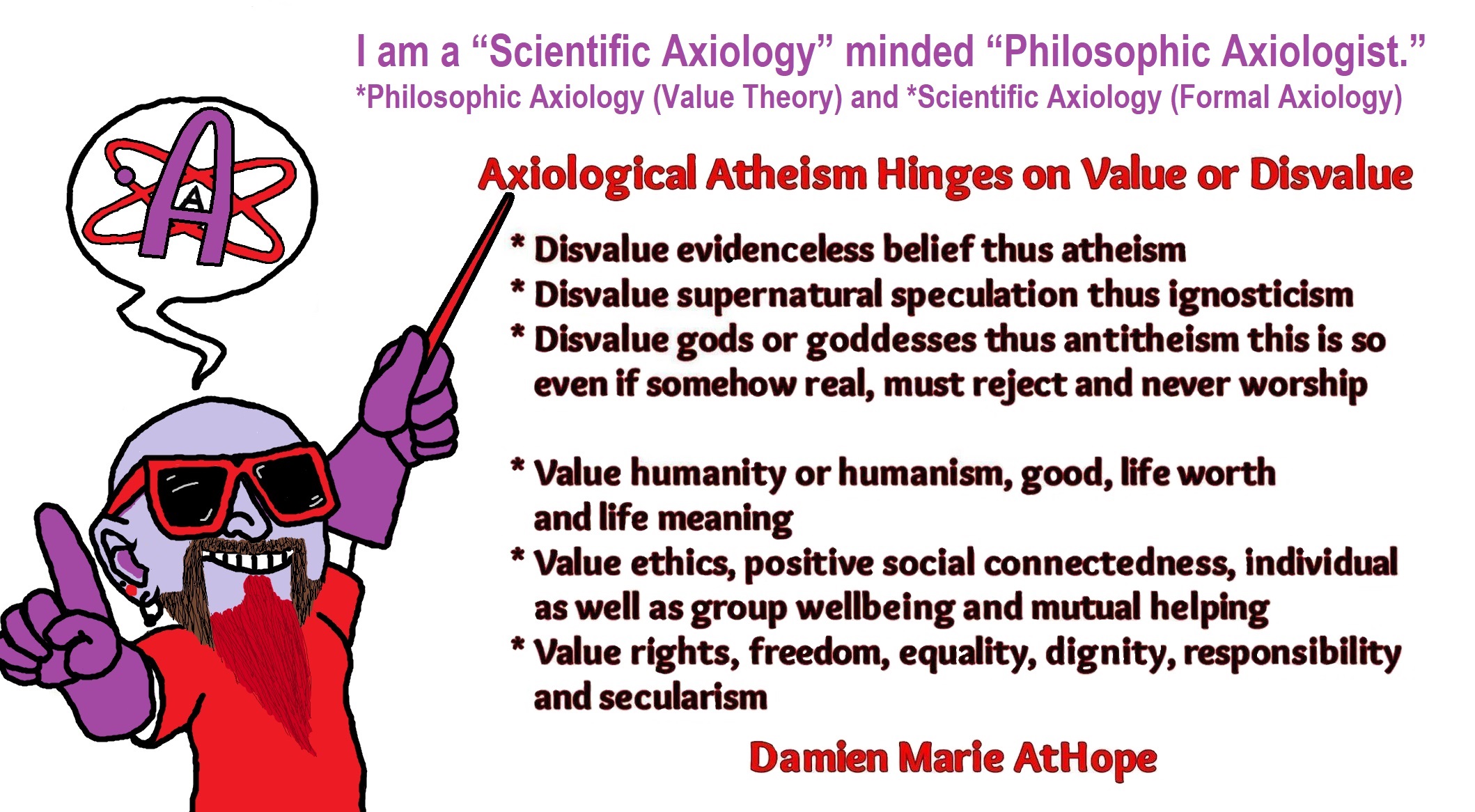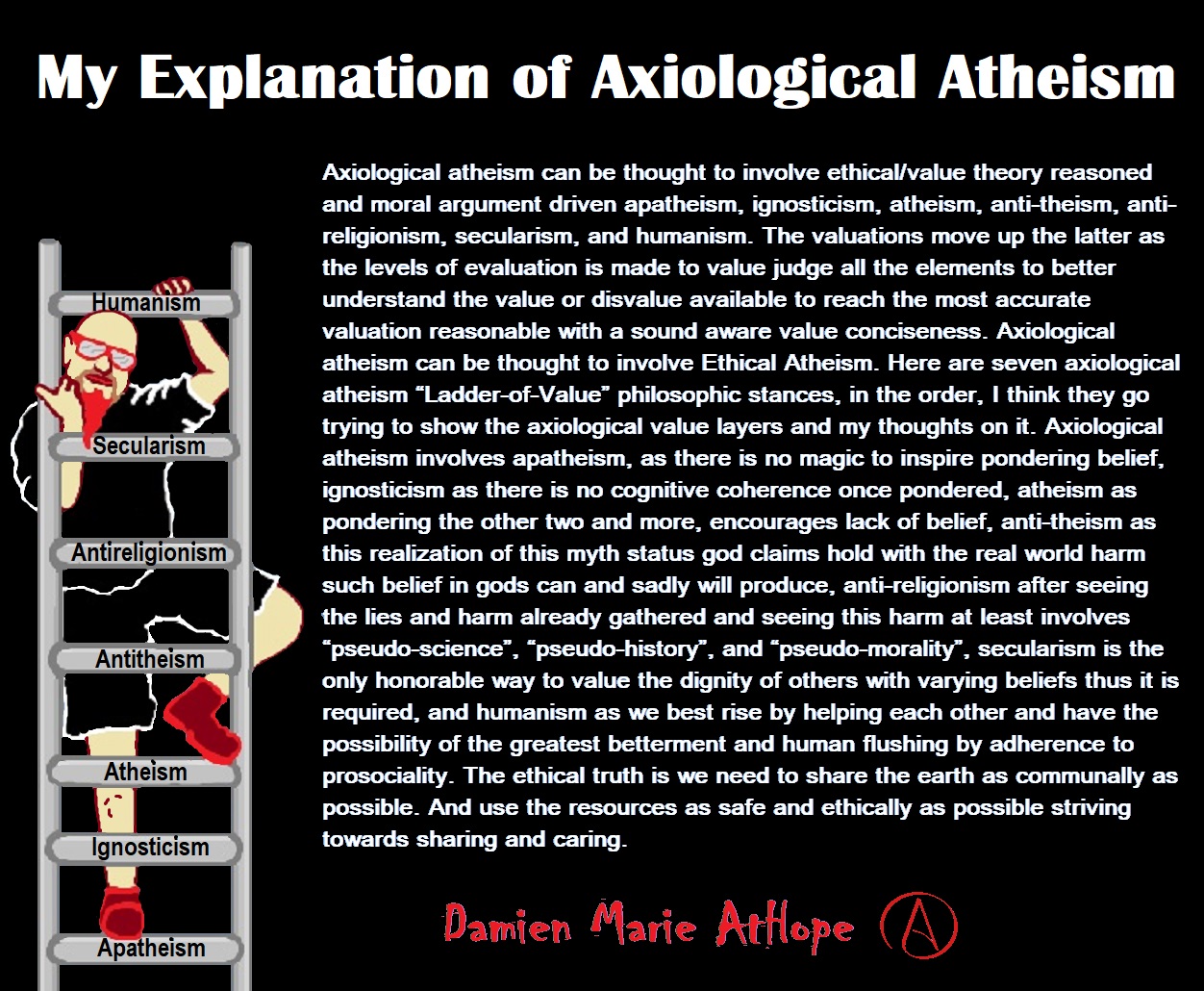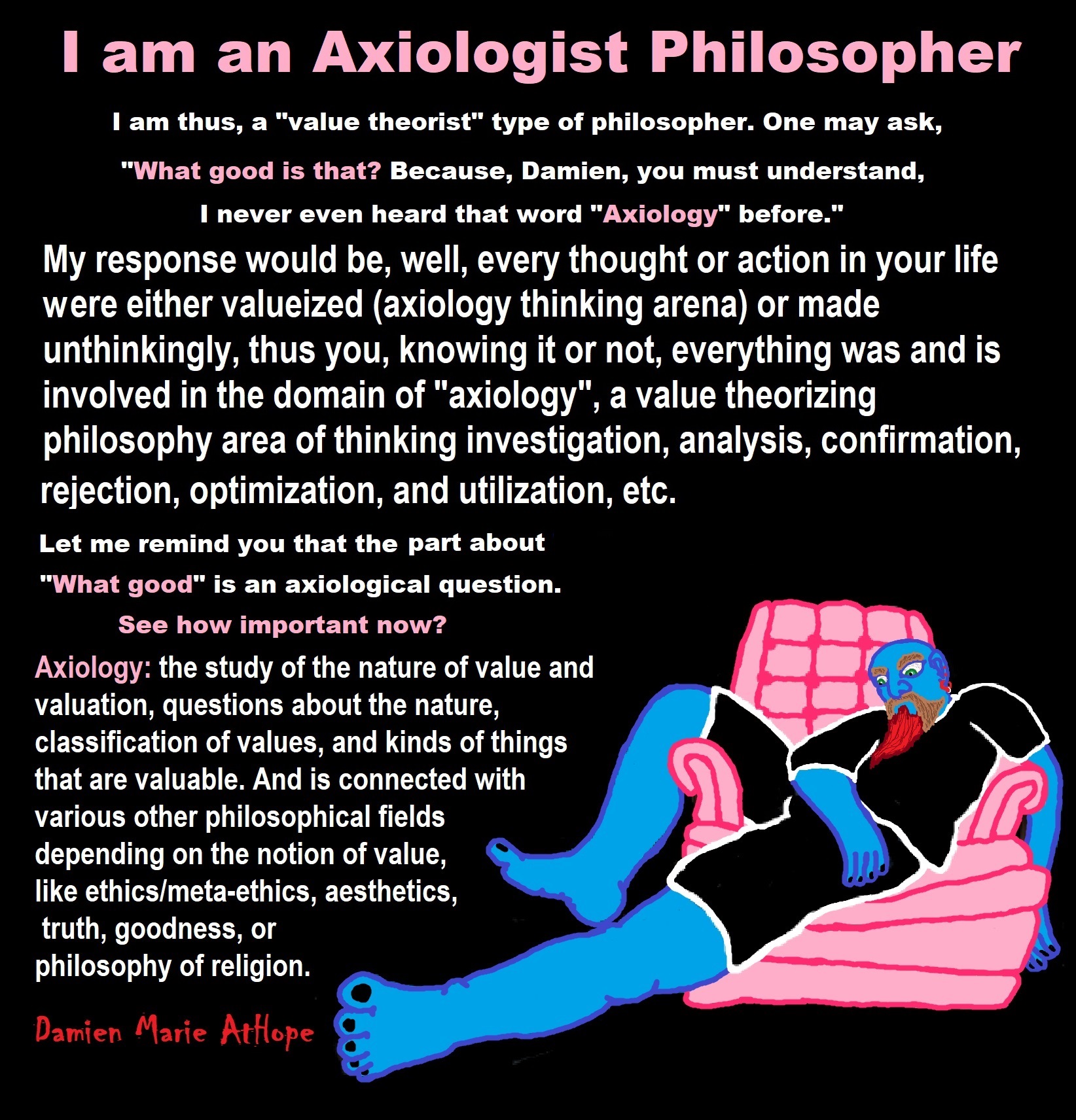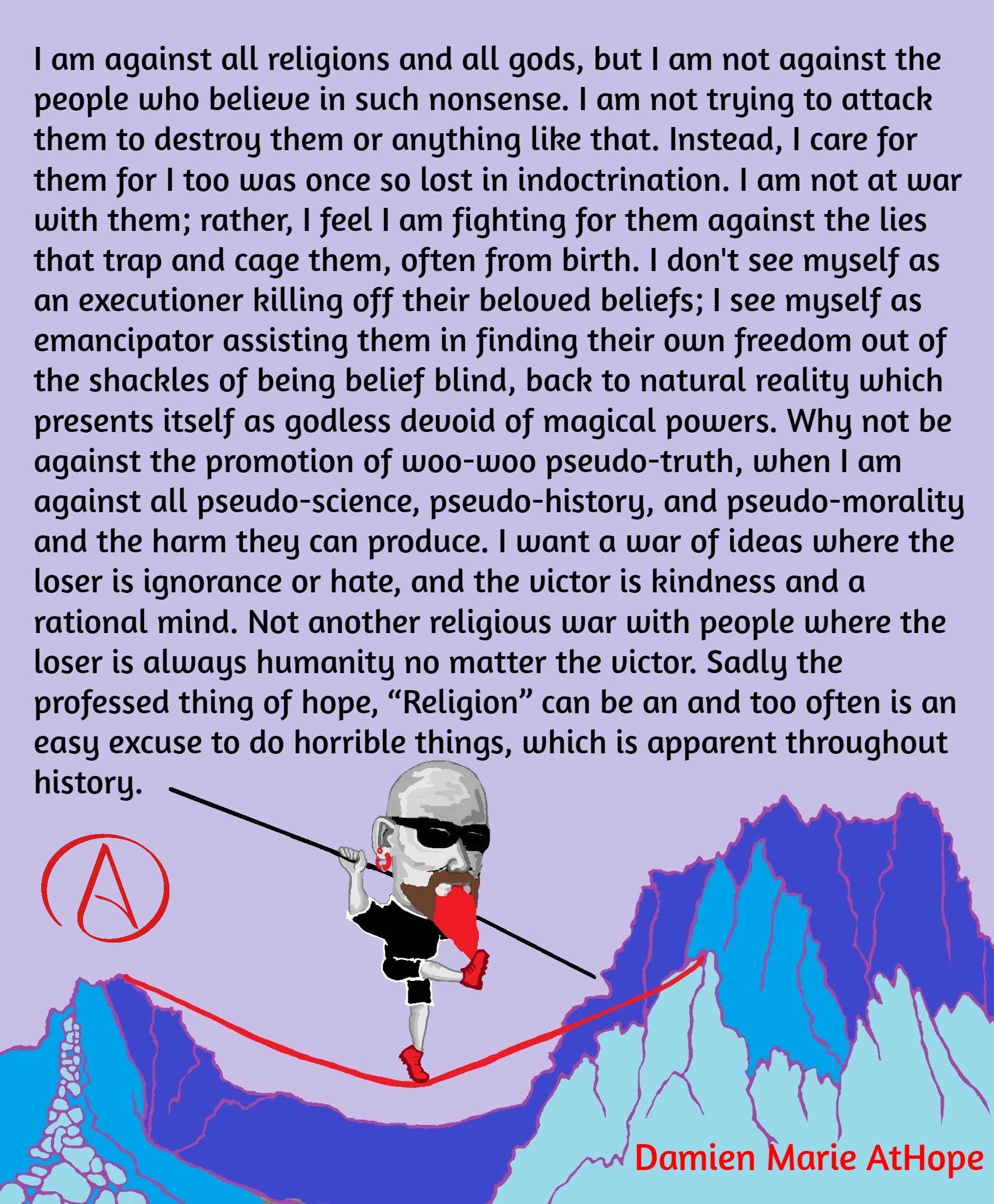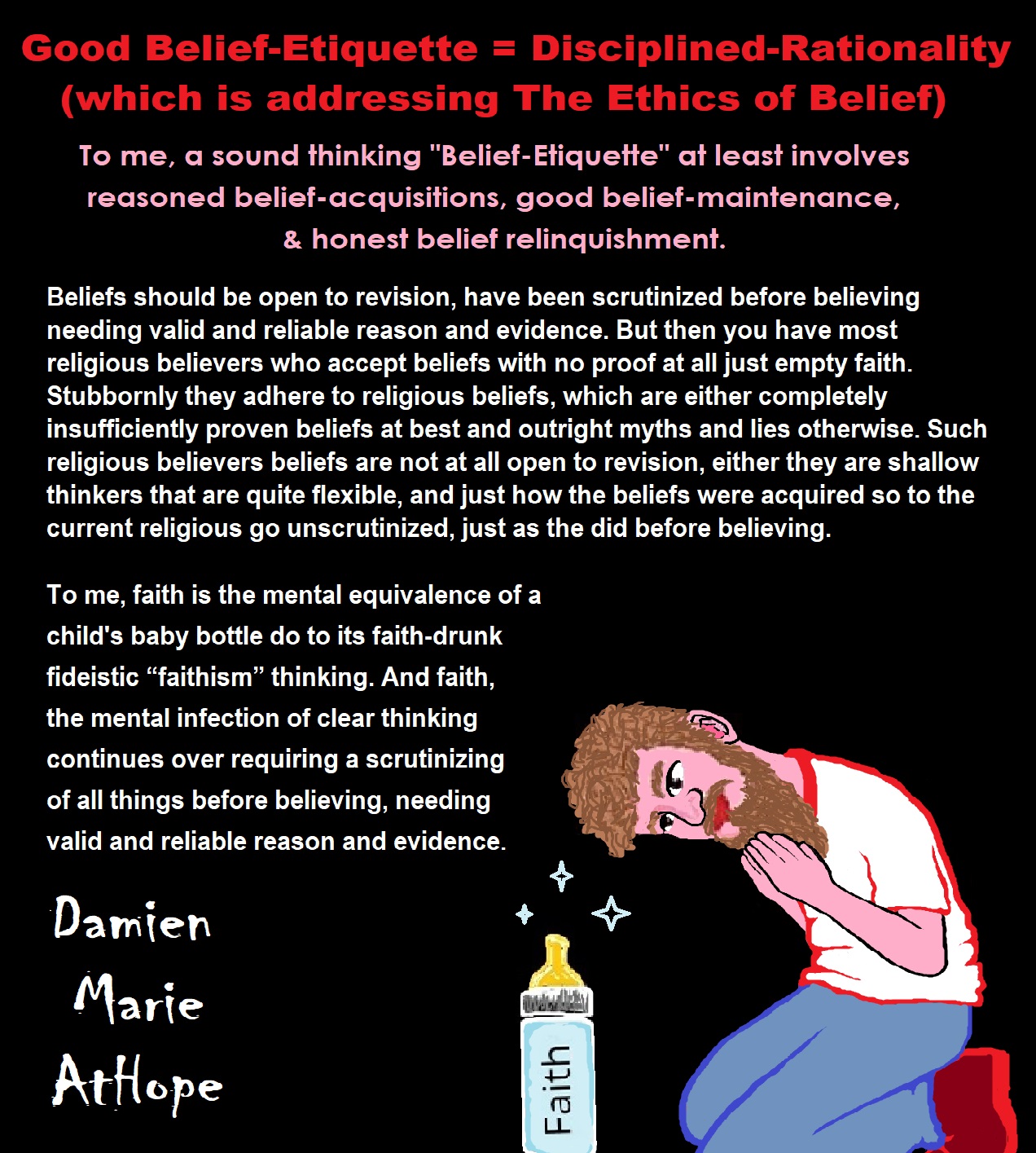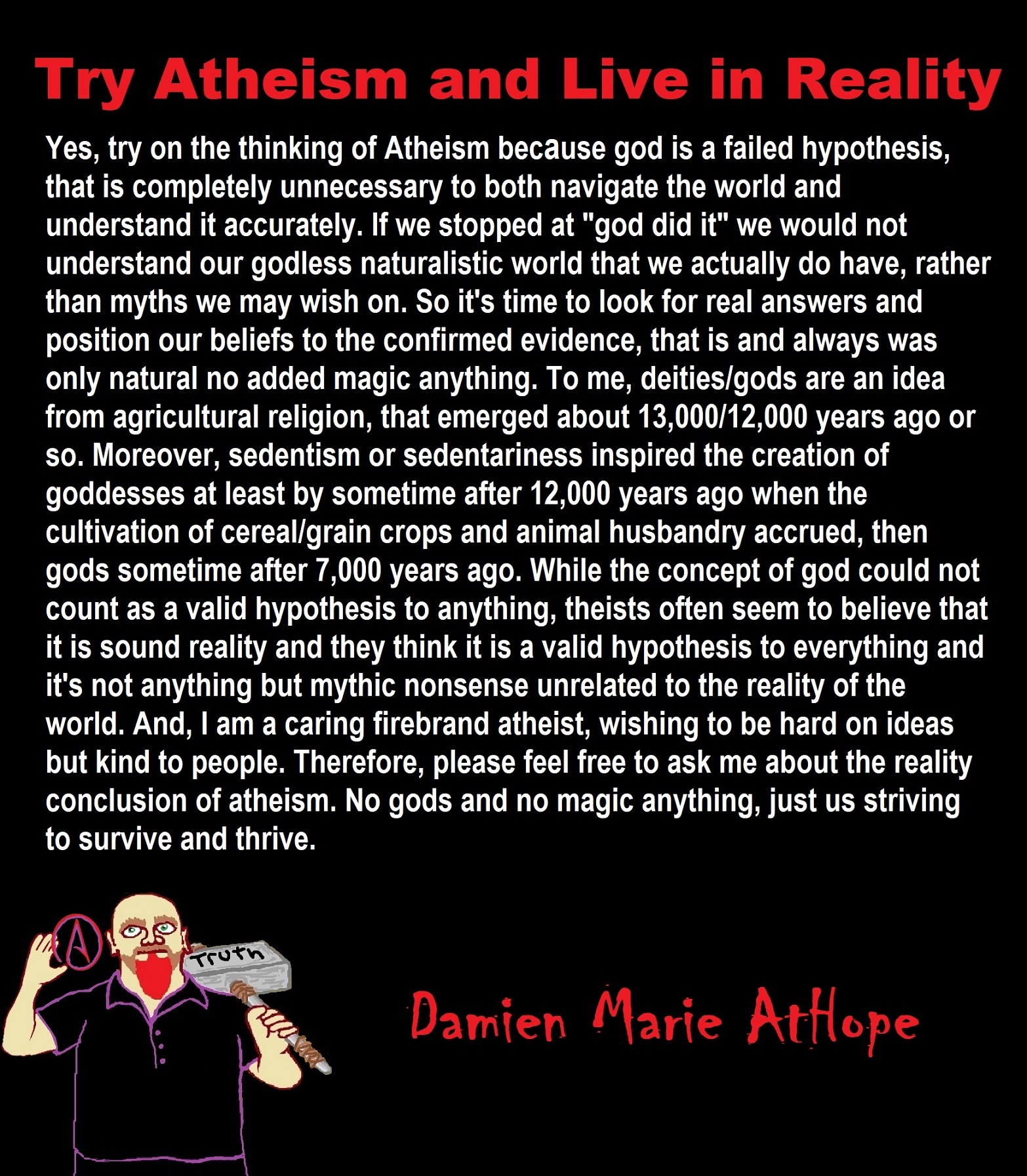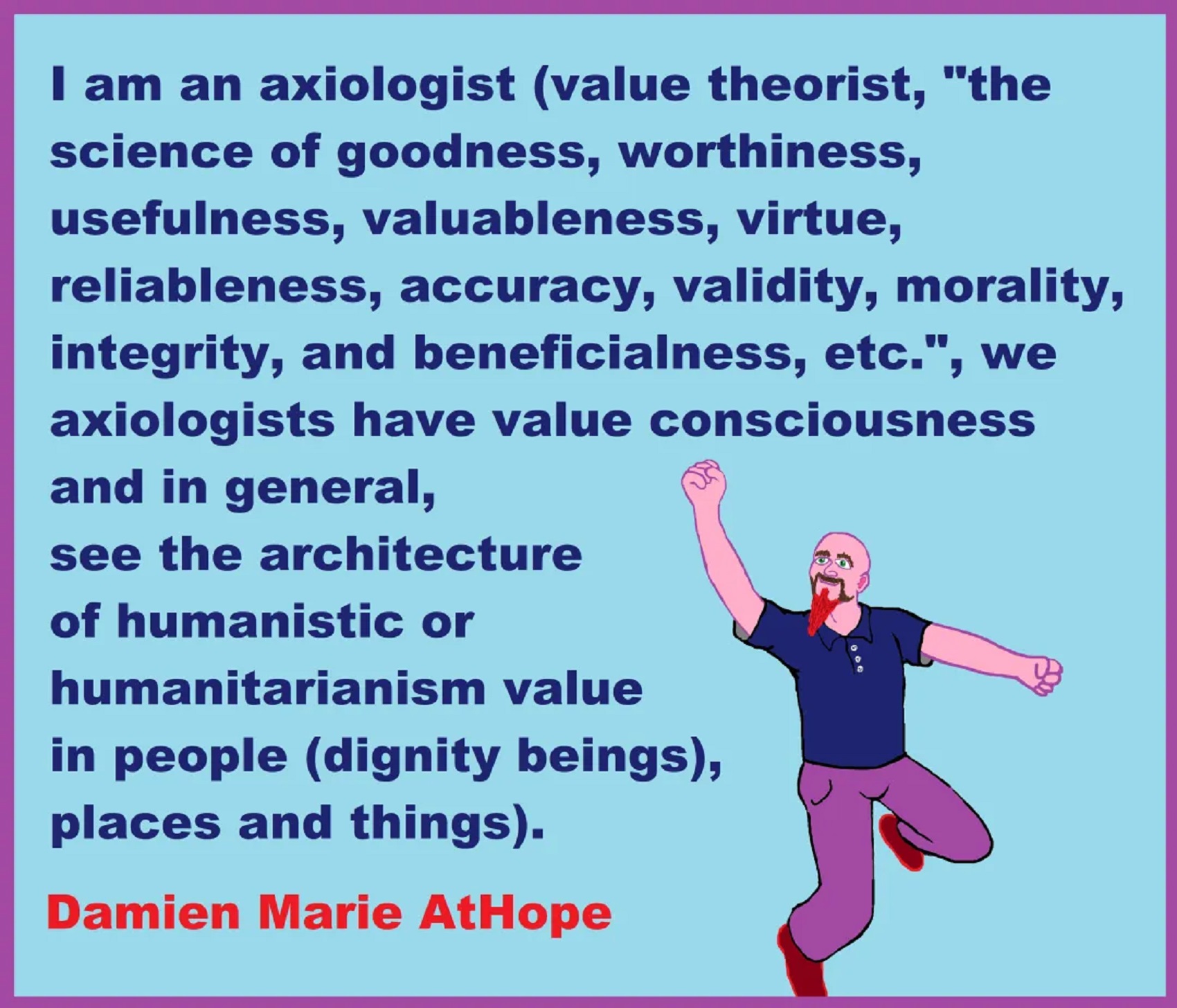
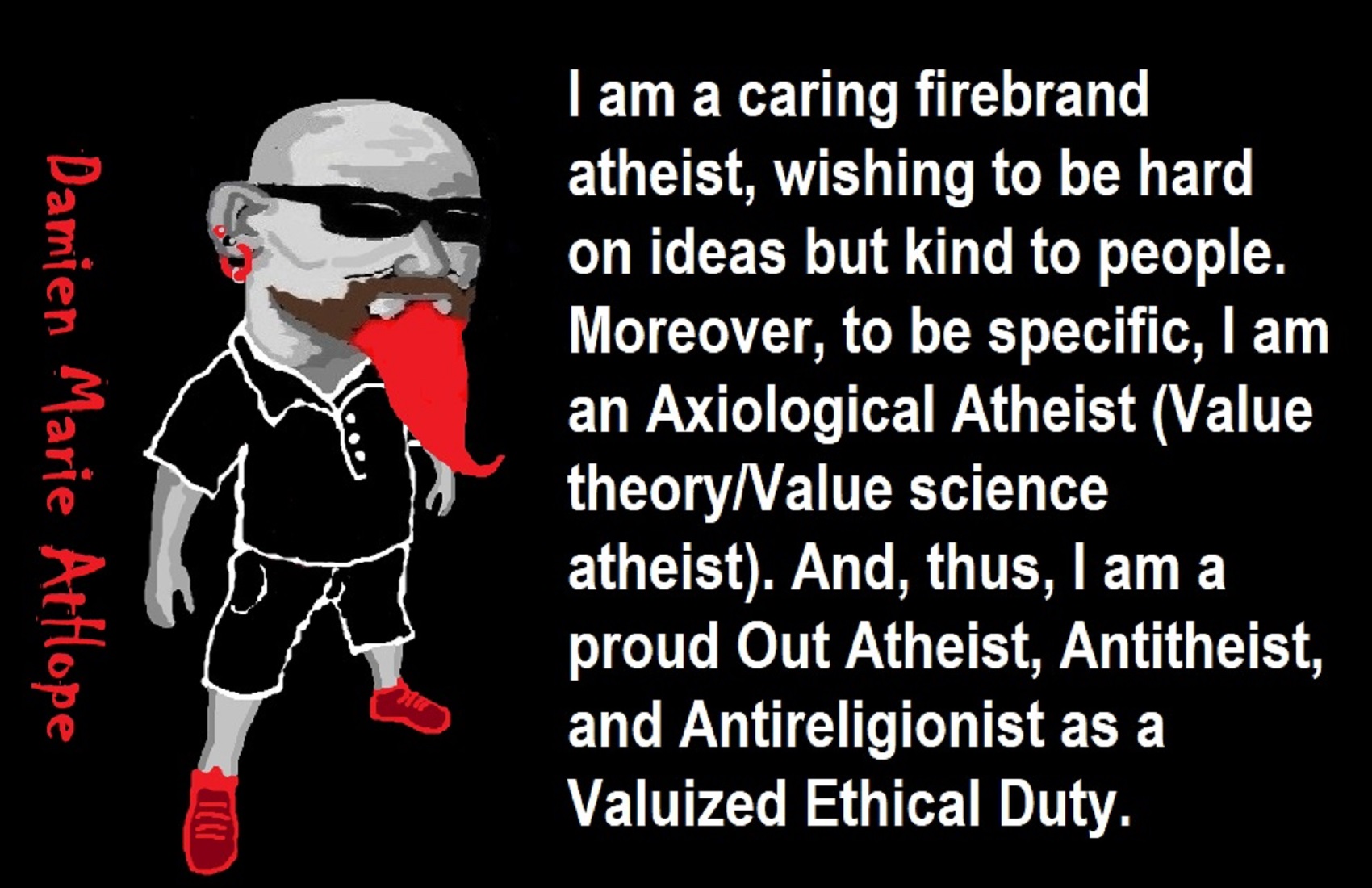
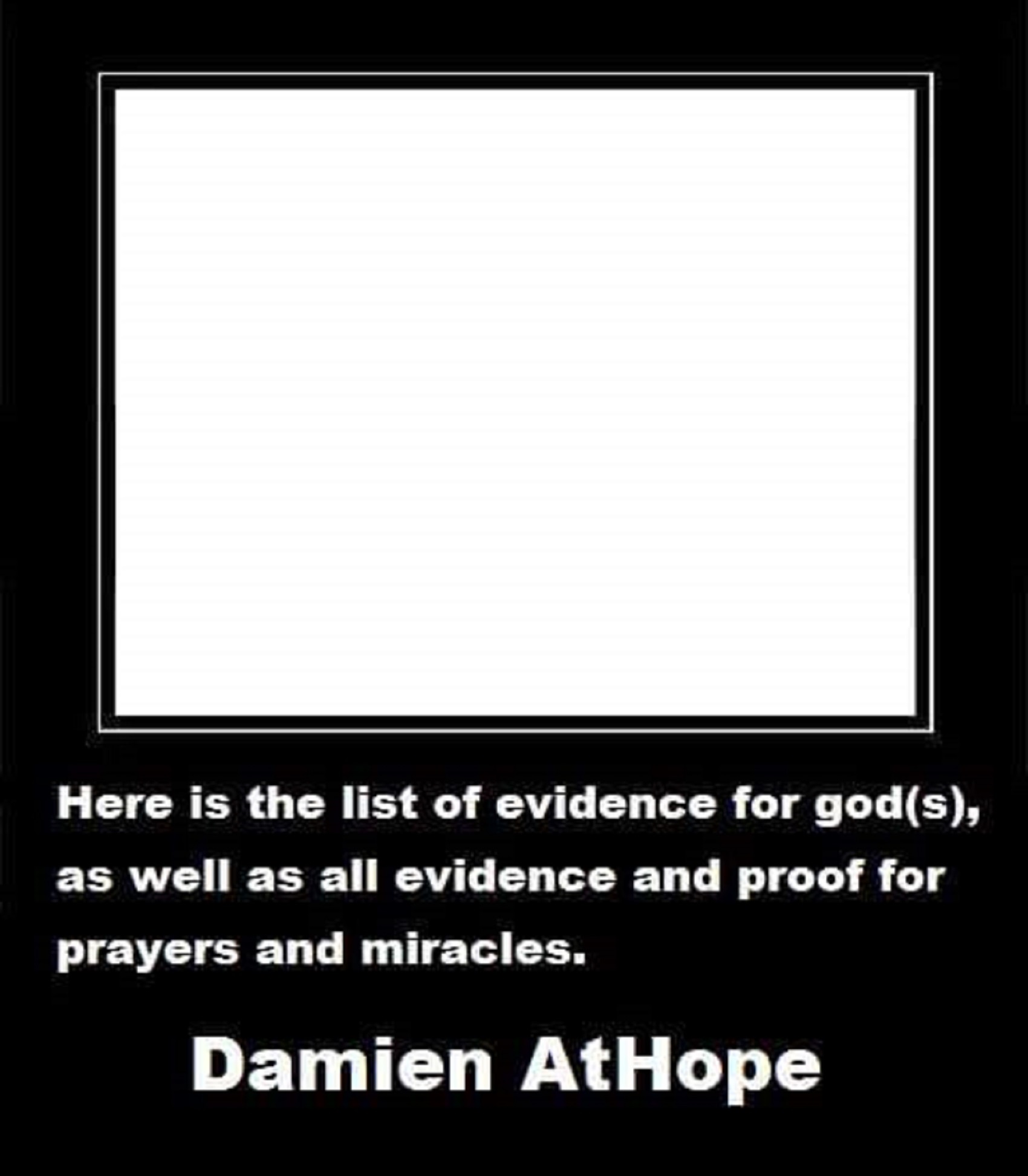
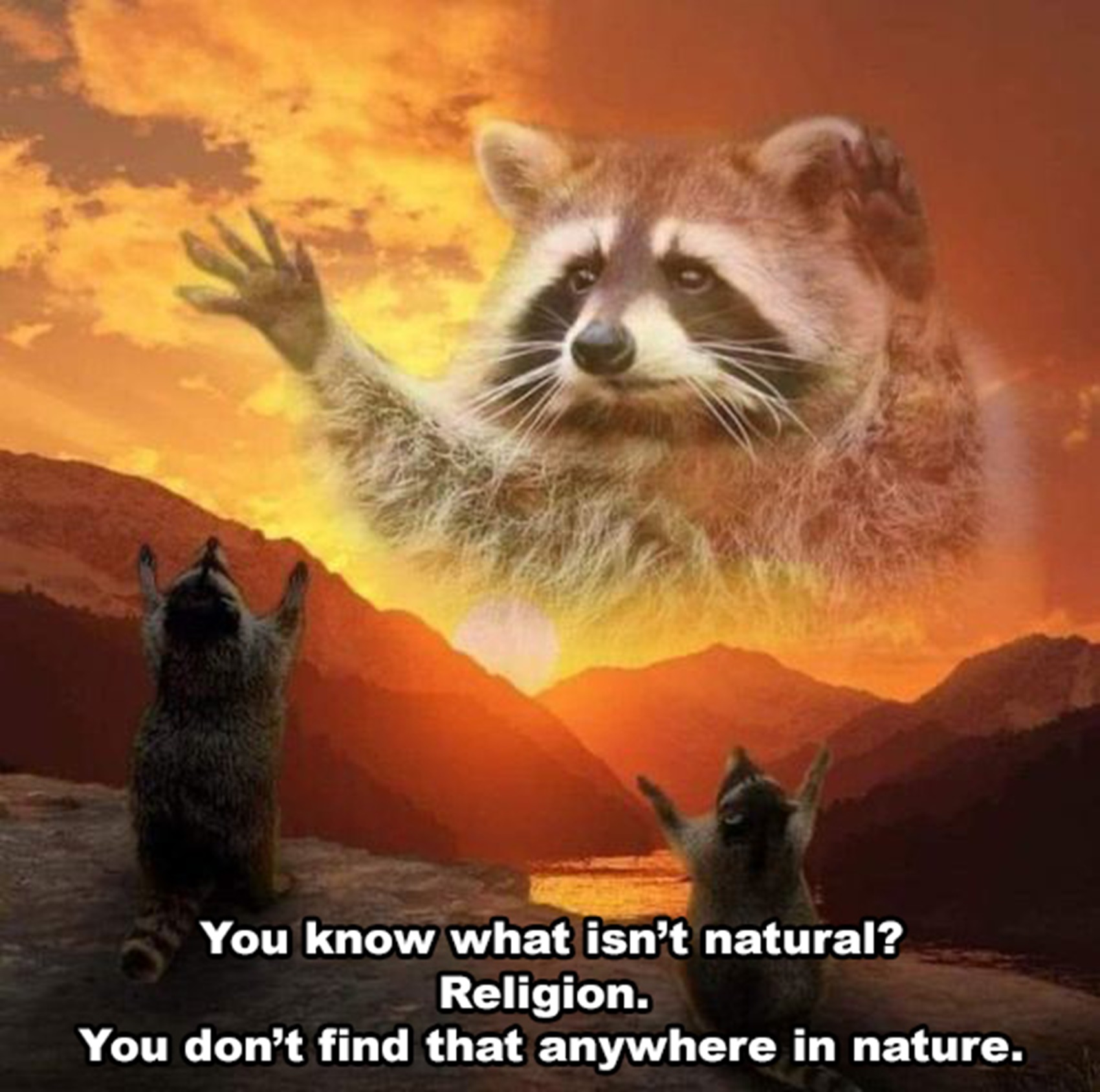
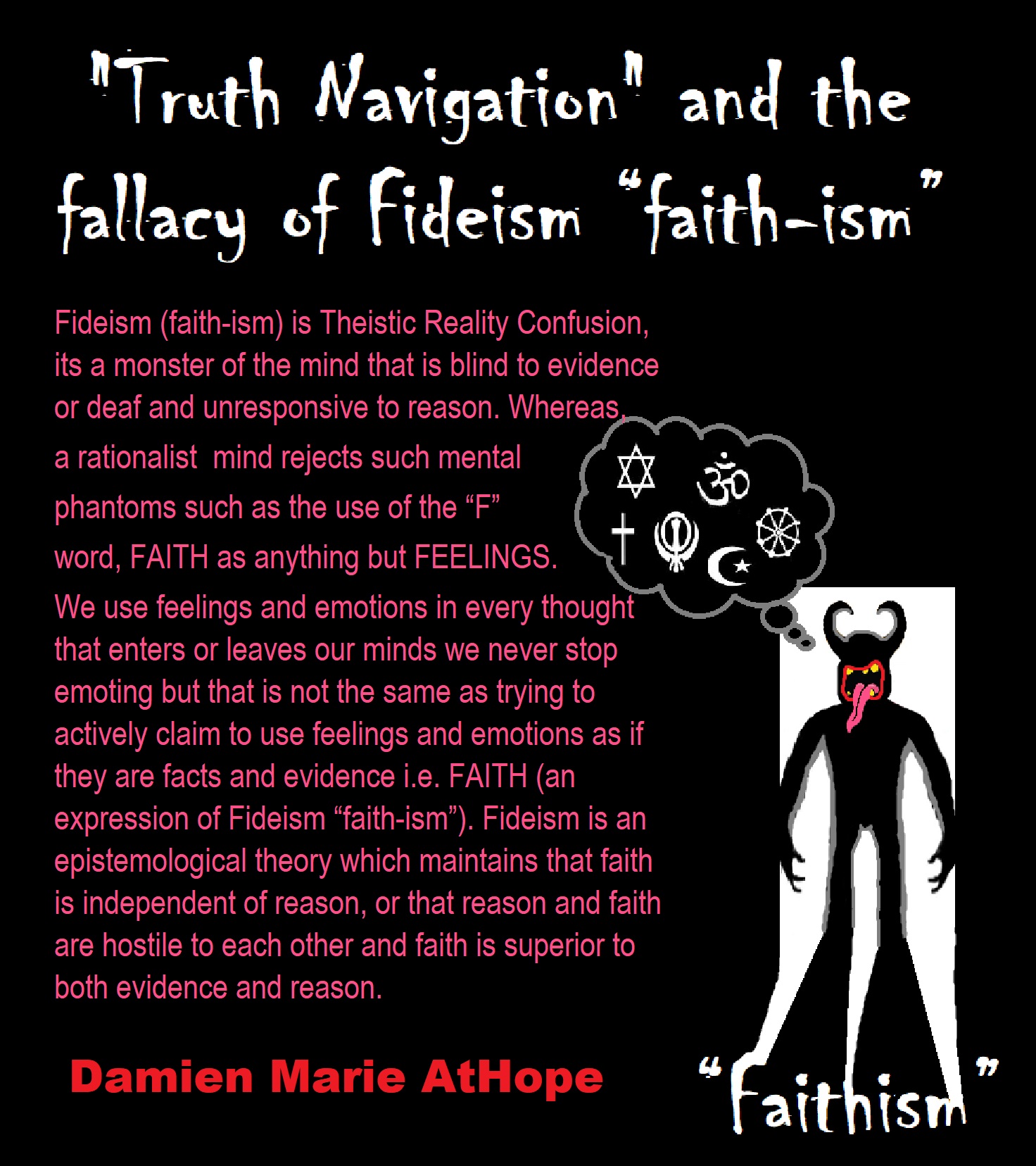
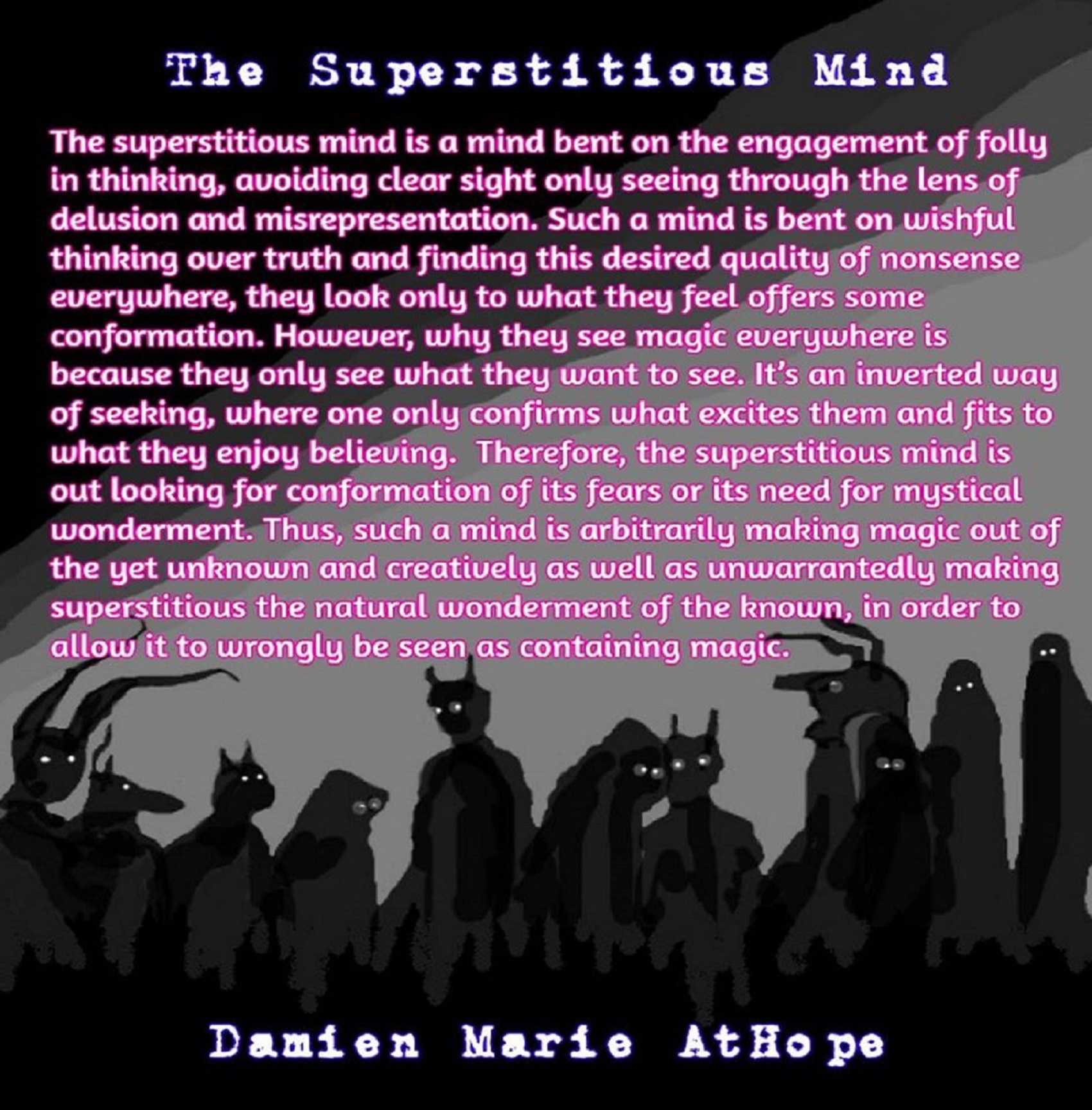
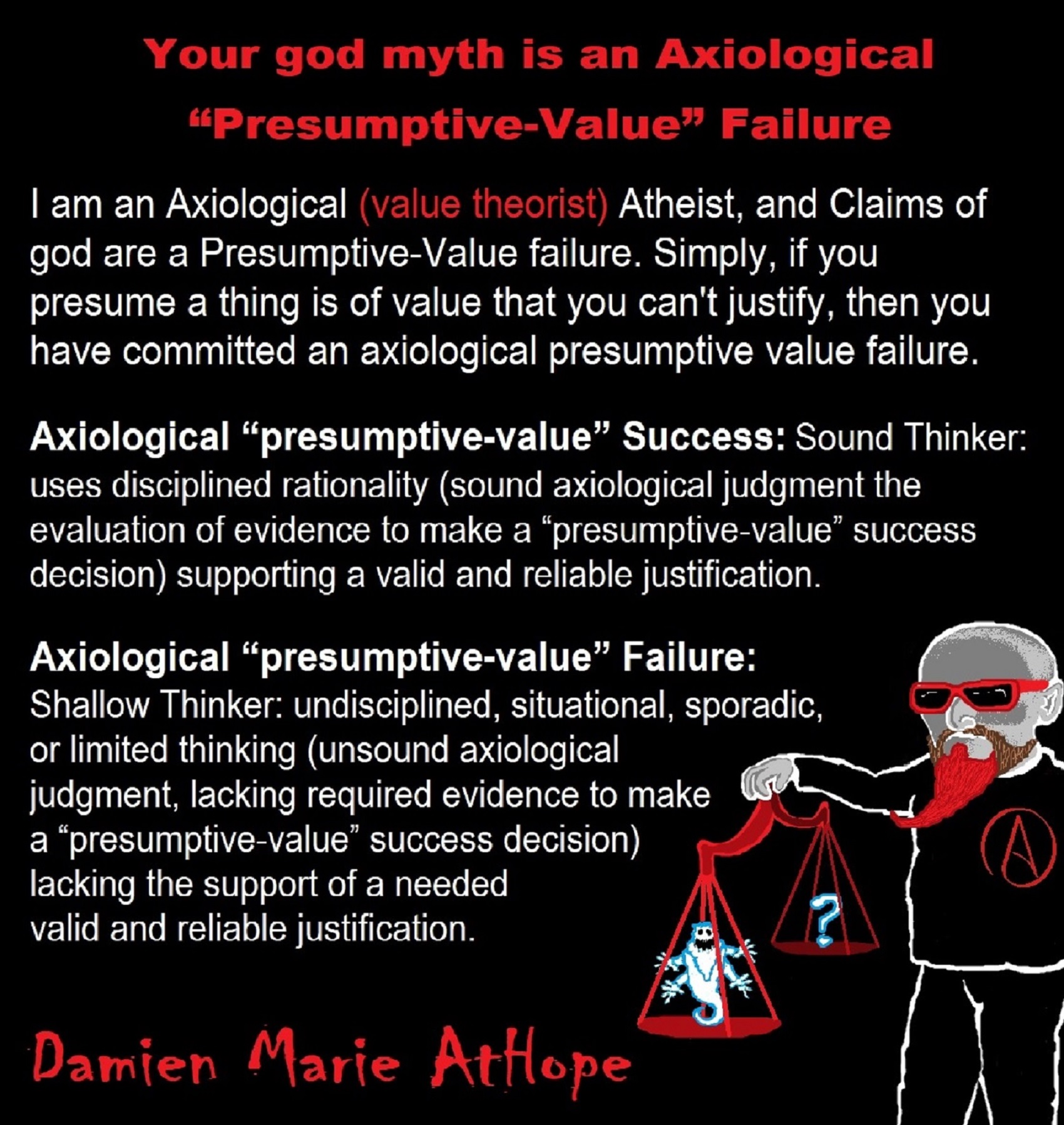
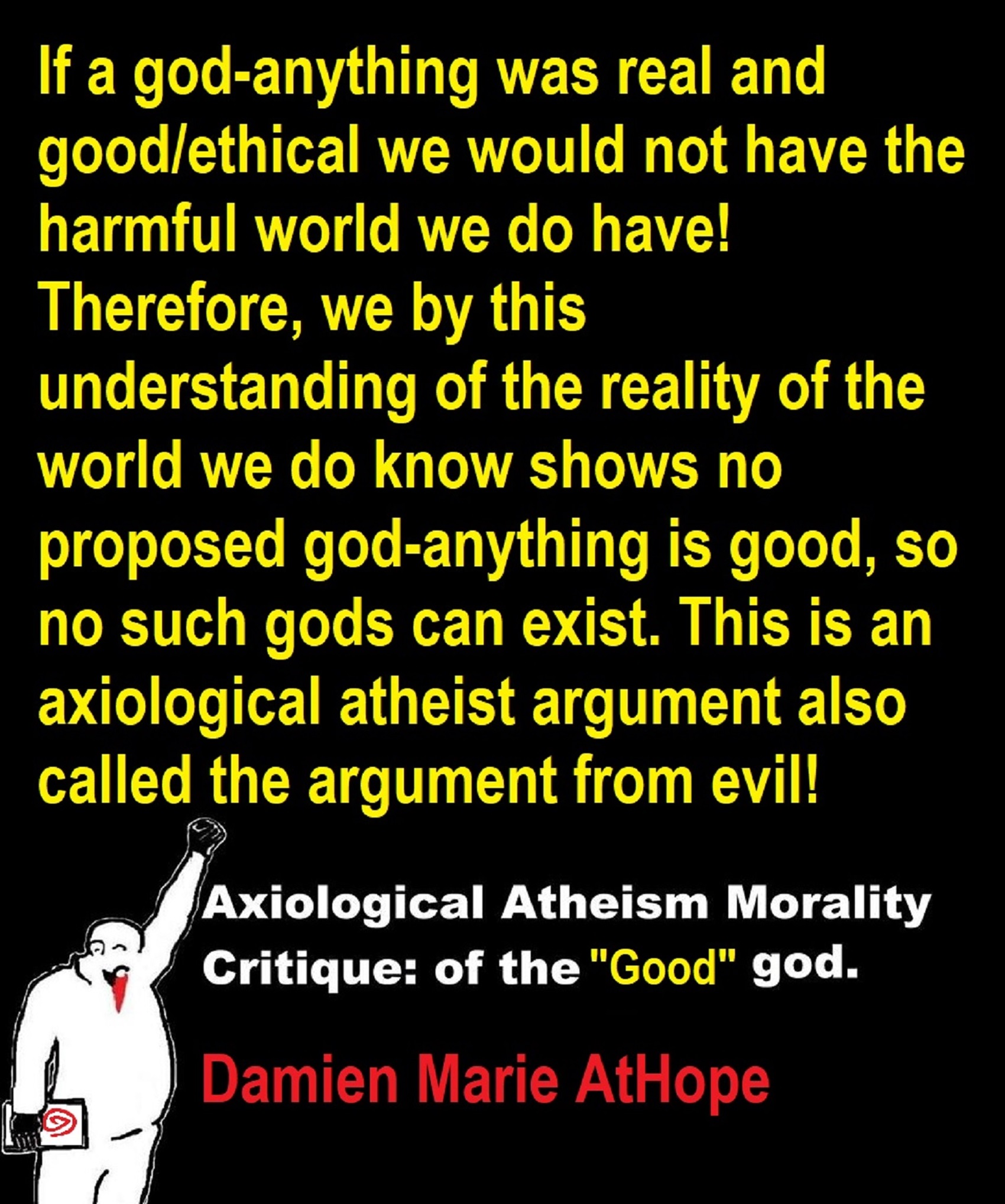
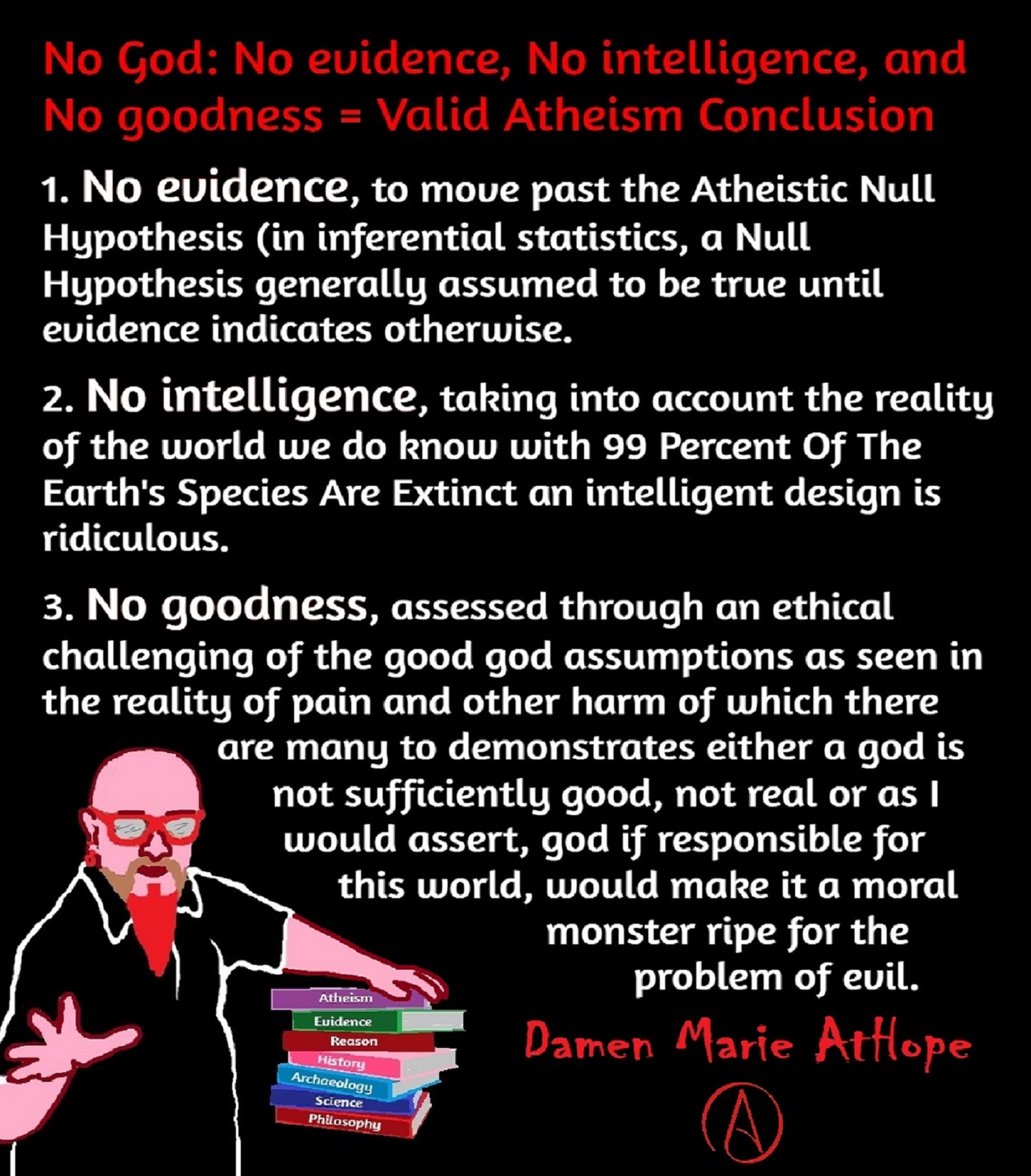
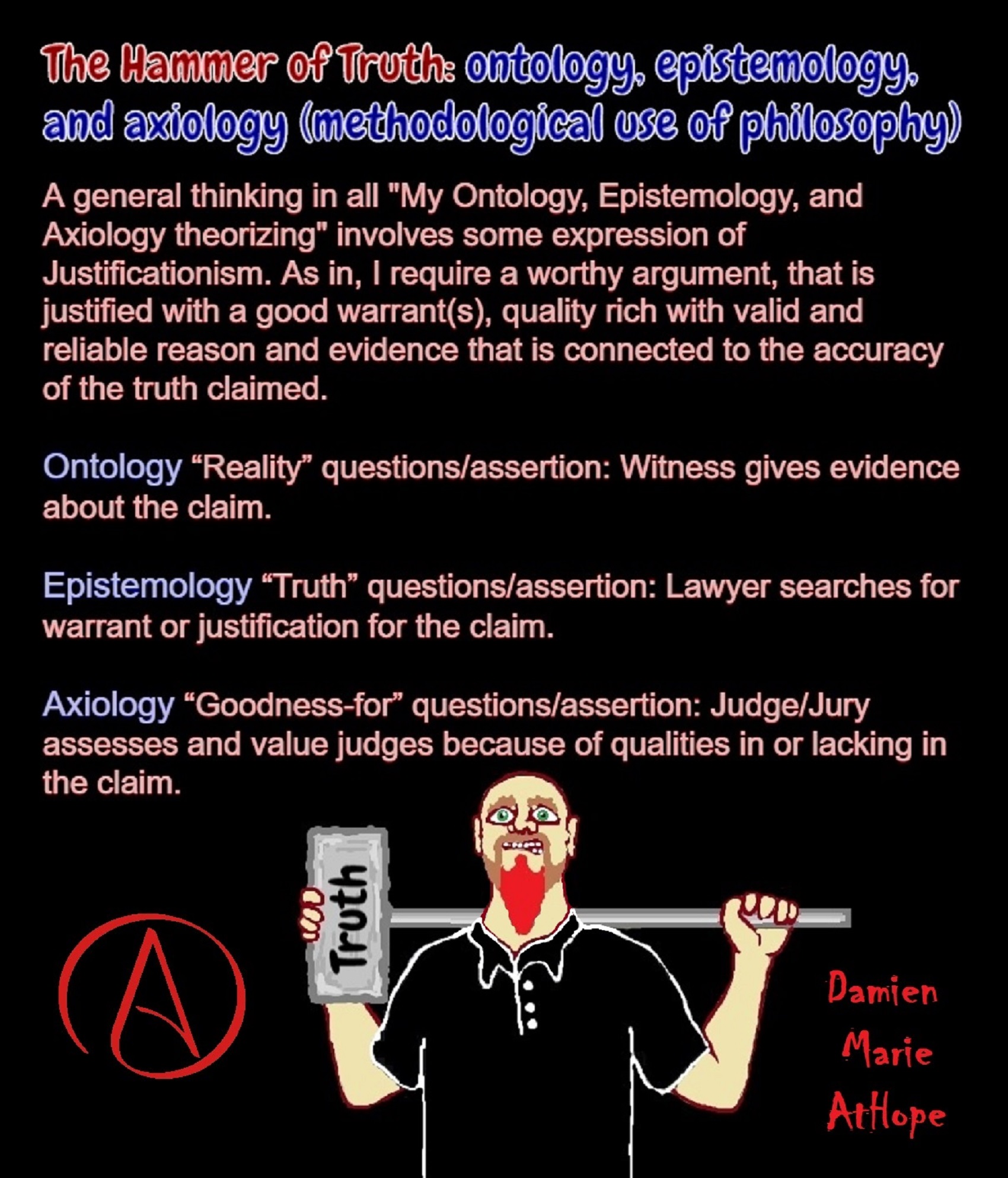
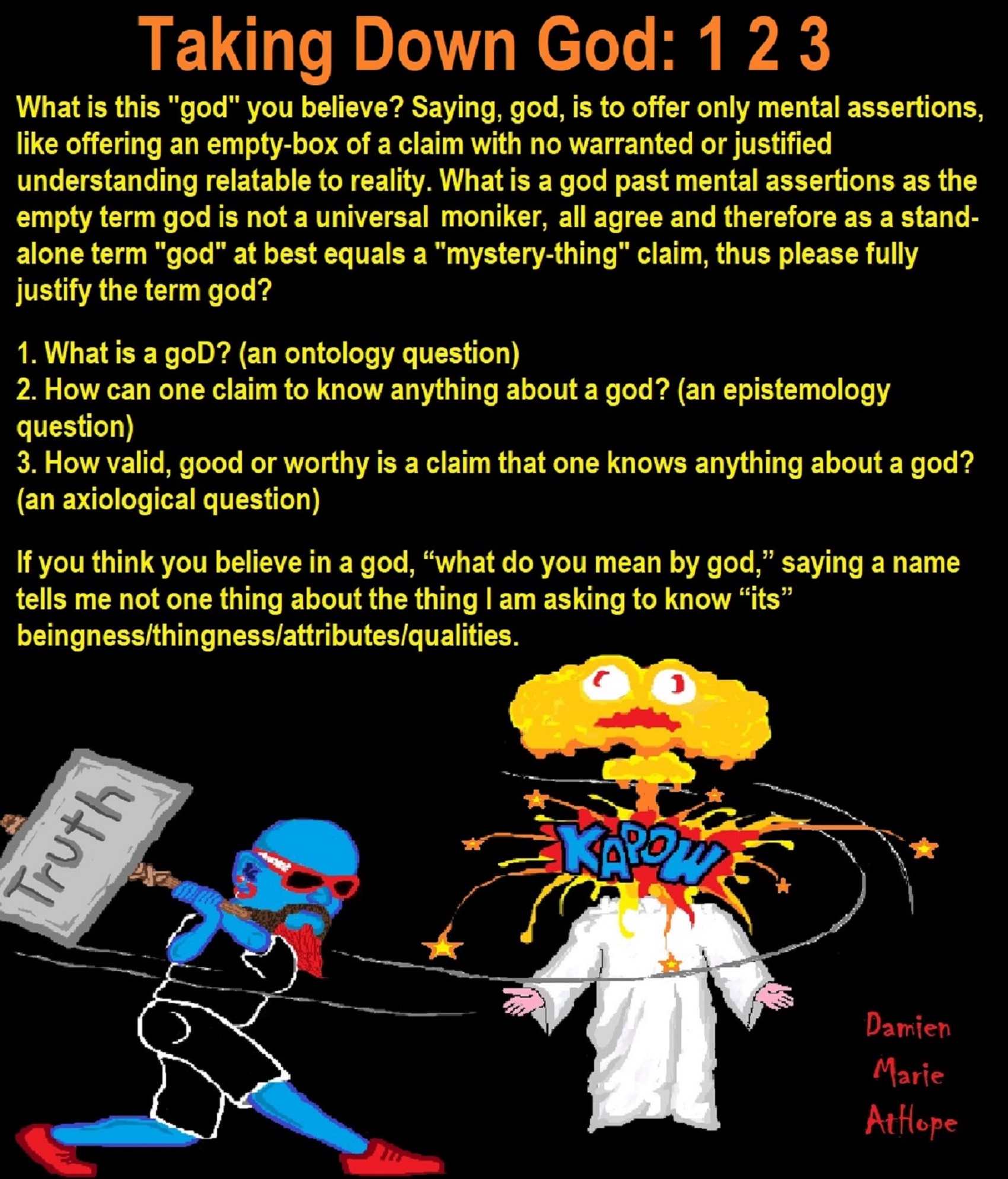
Using Axiological Awareness to Assist in Argumentation.
Axiology “Goodness-for” questions/assertion: Judge/Jury assesses and value judges because of qualities in or lacking in the claim.
*Axiology, (understanding what is good or valuable as well as what is evil or unvaluable like how the stories about theist theistic gods are often racist, sexist, homophobic, transphobic intersexphobic, xenophobic, etc. Thus, they are directly against humanity and thus are evil and unvaluable. Unvaluable; as in the god concept you have is evil and demonstrably harmful and thus is highly unvaluable to humanity) Truth is a value judgment we place on what we believe is evidence. Moreover, used in this context evidence is anything offered in support of a statement or claim. Therefore, for a thing to be justified in holding the label of truth, the status of its evidence must hold a high warrant to its conformation or very elevated likelihood to its confirmed status.
-Why are your objects of proposed value subjective psychological states or objective physiological external world states for your claim?
-Why do your purposed descriptive words fit qualities for valuation (such as “powerful”, “knowing”, and “present” in the Omnipotent: all-powerful, Omniscient: all-knowing, and Omnipresent: all-present god assertion) your claim?
-Why is your value-for, worth-for, and/or goodness-for claims different than other similar claims?
Truth is a Value (axiological) Judgment.
A fact is a statement that is consistent with reality or can be proven with evidence. The word “fact” derives from the Latin factum, and was first used in English with the same meaning: a thing done or performed, a meaning now obsolete. The common usage of “something that has really occurred or is the case” dates from the middle of the sixteenth century. Fact is sometimes used synonymously with truth, as distinct from opinions, falsehoods, or matters of taste. https://en.wikipedia.org/wiki/Fact
What makes a belief an epistemically justified belief?
Probability, best explanation, logical consistency, natural
consistency, reliability, and the broadest possible view of plausibility, are some of the standards that must be met. http://philosophyideas.com/…/papers/Justified%20belief.pdf
Strong vs Weak Thinkers
A strong thinker can deeply analyze their own positions removing all that is unworthy and updating to the most currently accurate. Whereas a weak thinker can only offer deep attacks to the positions of others that differ in thinking.
Just think, are your beliefs further supporting rhetoric or accuracy to the facts and are you ready to change if you have it the other way around?
Believer vs Thinker
When you can, with all honesty, say that you put a similar voracity to one’s own ideas as they demand for others then they are a thinker, not just a believer. And when you can quickly and eagerly relinquish any and all ideas, even the most cherished if they were not true; yes a willingness to discuss or discard if required, even if you like them is being a thinker and not just an unthinking believer.
We Love Generalizations (even if wrong)
We don’t like slow clear accurate thinking, no, we are often biased, irrational, and compulsive disordered hasty generalizations thinking beings. We build our “belief” of the accuracy of our hasty generalizations one assertion at a time. In other words, we add undue increasing assurance because we keep saying it over and over again, not because it’s actually accurate to the facts. We may cherry pick a few facts to support this error in thinking but that is intellectual dishonestly, as if it can be destroyed by the truth it should be.
Axiology “Goodness-for” questions/assertion: Judge assesses and value judges because of qualities in or lacking in the claim.
*Axiology (understanding what is good or valuable as well as what is evil or unvaluable like how the stories about theist theistic gods are often racist, sexist, homophobic, transphobic intersexphobic, xenophobic, etc. Thus, they are directly against humanity and thus are evil and unvaluable. Unvaluable; as in the god concept you have is evil and demonstrably harmful and thus is highly unvaluable to humanity)
-Why are your objects of proposed value subjective psychological states or objective physiological external world states for your claim?
-Why do your purposed descriptive words fit qualities for valuation (such as “powerful”, “knowing”, and “present” in the Omnipotent: all-powerful, Omniscient: all-knowing, and Omnipresent: all-present god assertion) your claim?
-Why is your value-for, worth-for, and/or goodness-for claims different than other similar claims?
Take for instance how Religion supporters try the evaluation tactic of saying “there are peaceful Religions.”
I may respond, “what value do you think what you are saying has and to what level of proof do you feel truth needs as well as how do you ensure Accuracy” (asking to find the truth or as usual expose the lack of a good Axiology)
Let’s look at the “gOD claim” with the Hammer of Truth
To me god is a the Presuppositional Error it assumes unsupported oncology assumptions. First, truly what is a god and how can you claim to know about it? Guessing is not evidence, neither is wild, unfounded assertions that are written in reality devoid documents such as holy books. Atheists do not have to prove that gods do not exist, as gods have never been proven to exist. Nor is there any good reason to think they could exist! In the branch of linguistics known as pragmatics, a presupposition is an implicit assumption about the world or background belief relating to an utterance whose truth is taken for granted in discourse.
Let me explain why as an axiological atheist (value theory atheist) even the belief in the concept of god is ethically vile to me. God belief is inherently immoral to me it is the belief that supports an all-powerful being who willfully allows suffering, something that no ethical person would tolerate if they had the ability to do otherwise. Moreover, a common attribute of god belief is support of this claimed greater being of high intelligence and self will forcing its will and standards on other beings of high intelligence and self-will. This force is unethical and abusive to the rights of humanity. Furthermore, many who subscribe to this force abusive relationship god claim an even more revolting ethical atrocity called hell where eternal horror and suffering is dished out by direct will of the claimed stronger immoral god being against the defenseless undeserving subjugated humanity. Thus, being one, who values rights and ethics, it sickens me to even speak of such willful misconduct of justice. Your god concept is vile… (axiology value judgment).
The god claim is like a clown car rolling in from out of nowhere and it seems like it is only one or possibly a few bad ideas, but no. No, it is a dark festival that masquerades as truth but it is only an evil funhouse of mirrors that distorts reality. The term god is an empty meaningless term and if it was not for man-made myths or wild speculations which are usually the misinterpretations of nature, no one would claim to know what a god is or could be. Unless one falls back to the circus of fallacies in the magic big top of fideism and the faith fallacy that you do not need anything but faith to validate, justify, or prove any mystical belief you so desire.
The God Fallacy is that there is no epistemically warranted or justifiably reliable evidence for god(s) existence; most ideas offered are stretches of unreason promoting seemingly implausible knowledge or reality claims. Moreover, beyond this is the self-evident realization that there is no reliable and /or verifiable evidence that could be used to define what god term actually is or could be assured to involve. Because it is never good to just randomly conceptualize or fabricate from bias trying to force connections into existence. epistemically warranted or justifiably reliable evidence or even a preset of proofs that do not hold gaps a believer want to fill with an arbitrary beliefs things need a god explanation and yet again what does god even mean. One his furthered nothing with god talk until they offer clear links to understand what could rightly make up the empty term g. o. d. (Group Originated Delusion).
Any reasonable thinker should conclude that clear links to any knowledge are required to comprehend what to ask, where to look, or what to state is involved. This would seem especially important since what is on the line is the actual truth or falsehood of the great believed “IT” of somethingism. Do you wish to just assemble or make up your god thinking as you go, greedily forcing anything that seems slow enough to not get away or is the actual truth in reality you seek even if godless as finding the truth is the main pursuit, as your aim is what true right, taken with the deepest integrity? One should desire such intellectual rigor in order to even distinguish if we need to inquire or have a way to question a possibility of existence, as this empty termed “it” god of nothingism is unknown in every way even in its “it” status outside of faith superstitions, Dogmatic–Propaganda, delusion, myths and lies.
Religion is just Dogmatic–Propaganda, such as how it is wrong to start with full belief built only upon faith: then search and anything unknown, claiming it somehow justifies or is evidence for their specific God Fallacy.
Another attribute of the God Fallacy is that believers seem to insinuate, if they can in anyway demonstrate (even the possibility of a thing that could seem to be a something attributed to a god) then they have proved that the god they believe in is true. And yet is it not true that man will always fail to prove a specific god? Religion is big on claims but small on reasoning. Take the Abrahamic faiths; they propose a very specific, well-defined god, but in reality, they advocate a very unspecified god; a naturalistic, inferred-theistic-creationism or the god of intelligent design. In other words, when pressed to demonstrate god in the world, or as the reason for the big bang, they can at best only try to surmise a magical power or unknown and unknowable possible something as the “creator.” But the question needs to asked, how does that prove any specific god? So even if we were to concede, for the sake of argument, that some god, phantom-menace started things, they still have to show that this god is the very same as the god in which they believe.
The truth is, for all the appeals they make to nature in order to justify their god, not one appeal is valid in any way to confirm that their god (and only their god) is true, they must always leave the facts and return to faith. Thus, these haughty theists always fail to show any naturalistic reasons for believing in their special-needs god. What they show instead is a belief, not in the god of some myth or scriptures, but belief in a projected somethingism-god attributed to nature, which is indistinguishable from a nothingism, godless reality attributed by nature. However, the issues don’t stop there, as they also would have to prove, or give warrant, as well as justification for every attribute and claimed character trait attached to their specific god using only natural arguments, not some Holy Book or otherworldly revelation.
Coherent Definition of god?
I am an Ignostic atheist and not only do not believe in the term gods I reject that even the term or concept of god has any real thing or true reality connected definition. To me there is no one coherent definition of god even if they think articulation proves real meaning, this proves little more that me saying someone believes in a “Triangle-Square-Circle”. To the term god I thus, regard it as empty of real meaning and or real definition constancy, so I see it as something that is not really known or knowable or coherently definable as a real object even if it can add arbitrary words to articulate it is still not something outside man-made arbitration.
One may say no the god definition is real one cannot say it is not, as most people generally know what the term god means thus that cannot be rejected. Really?? I could be misunderstanding this reasoning put against Ignostic Atheist thinking but to me it seems to hold the opinion, saying I must accept the god concept as something definable in reality because ad populum? In argumentation theory, an argumentum ad populum (Latin for “appeal to the people”) is a fallacious argument that concludes that a proposition is true because many or most people believe it: “If many believe so, it is so.”
Bigfoot’s, Unicorns, and Gods the rational conclusion using Axiology
So how do we form rational conclusions? More importantly, how do we differentiate between the levels involved to establish a conclusions rational viability.
It takes axiology or the value judgment the worthiness or lack thereof in relation to the available reason and evidence.
So let’s start with the axiological viability of Bigfoots
There is no available evidence for Bigfoots.
But is their proposition outside of reason?
Always start in reality from the evidence we do know, such as a primate/nonhuman hominid close to that of both humans and other nonhuman primates is not entirely outside all possibility of reason even though lacking all evidence. Therefore, belief is not warrant and the axiological worthiness of possibility is low enough to motivate disbelief.
Next The axiological viability of Unicorns (ie. a horse with a single horn on its head)
There is no evidence for Unicorns.
But is their proposition outside of reason?
As always start in reality from the evidence we do know, such as by looking at the evolution of the horse not once was there a horn on any of the several stages of animals to the horse we know today. So it is relatively outside of possibility though as it is still only claiming non-fantastic attributes it is only somewhat ridiculous. Therefore, belief is not in any way warranted and the axiological worthiness is so low to highly support disbelief.
Now the axiological validity of Gods
There is no evidence for Gods.
But is their proposition outside of reason?
As always start in reality from the evidence we do know, such as never in the history of scientific research or investigation has any supernatural claims shown to be true. So it is completely outside of possibility and is utterly ridiculous. Therefore, belief should be rejected as there are no warrants at all and it is axiologically unworthy to such a preponderance to demand disbelief.
The following are some evidence against a caring god working in the world. A recent study of the current living conditions throughout Africa shows that more than one billion people do not have enough clean water to provide for their basic human needs. As a result, more than 2,500 children are dying each day. I guess it is that god gives us free will by keeping children from clean water in an unproportioned amount to the civilized science filled world. I ask you, does your god not hear their prayers? According to Missionaries of Africa (2008), there is a water crisis and diseases that are living in dirty water are wiping out entire villages and communities. Does god exist? Does the magic chanting of prayer seem to work? Suppose for a minute with the understanding of religious believe, if there was a loving god and it answered even some prayers, would not the most deserving be the non-sinning? Moreover, what living human could be said to be less sinning than a baby and thus the most deserving. In addition, babies or children are likely the one’s religionists/fideists pray most often, for when they are in trouble. Belief changes nothing. Whatever circumstances you are in or not, has nothing to do with belief. If you are poor, belief does not make you not poor. If you are rich, you do not stay rich because of belief. You would think that poor people would have the benefit of the heavenly means and have god on their side, if anyone would, right? Overall, in 186 countries, first-day child death rates for babies are 6.9%. Where was god? In Angola, 8% of the babies die and 95% of the population is christian. In Congo, 7.5% of the babies die and 95.8 % of the population is christian. Whereas in Guinea-Bissau, 9% of the babies die and 10 % of the population is christian and in Niger 8.7% of the babies die and 5% of the population is christian. Therefore, being a christian and begging for an all-powerful all-loving god myth to do something that any half-decent human being would hardly even need to be asked to help an innocent child, shows that belief seems to make no difference in the world because the world is godless and sadly babies die. Isaiah 45:7 “I form the light, and create darkness: I make peace, and create evil: I god do all these things.” Ref
Just think, the bible god “could” have banned slavery or shellfish and he chose to ban shellfish (Leviticus 11:12) and actually support slavery (Leviticus 25:44-46) even in the new testament (Ephesians 6:5; 1 Timothy 6:1-2) and Jesus clearly approves of beating slaves even if they didn’t know they were doing anything wrong (Luke 12:47-48) how crazy and immoral is that for a man-made fairy tales. I will openly say faith is foolish lacking credibility and it is stupid to hold on to beliefs that are disproved by science fact. However, I don’t usually call people names even ones saying things I believe are ridiculous nor do I belittle them instead I strive to and support attacking the thinking and not the person.
Axiological “Presumptive-Value”
Your god myth is an Axiological “Presumptive-Value” Failure
I am an Axiological (value theorist) Atheist, and Claims of god are a Presumptive-Value failure. Simply, if you presume a thing is of value that you can’t justify, then you have committed an axiological presumptive value failure.
Axiological “presumptive-value” Success: Sound Thinker: uses disciplined rationality (sound axiological judgment the evaluation of evidence to make a decision) supporting a valid and reliable justification.
Axiological “presumptive-value” Failure: Shallow Thinker: undisciplined, situational, sporadic, or limited thinking (unsound axiological judgment, lacking required evidence to make a “presumptive-value” success decision) lacking the support of a needed valid and reliable justification.
“Presumptions are things that are credited as being true until evidence of their falsity is presented. Presumptions have many forms and value (Axiology) is just one. In ethics, value denotes the degree of importance of something or action, with the aim of determining what actions are best to do or what way is best to live (normative ethics), or to describe the significance of different actions. It may be described as treating actions as abstract objects, putting VALUE to them. It deals with right conduct and living a good life, in the sense that a highly, or at least relatively high valuable action may be regarded as ethically “good” (adjective sense), and that an action of low value, or relatively low in value, may be regarded as “bad”. What makes an action valuable may, in turn, depend on the ethic values of the objects it increases, decreases or alters. An object with “ethic value” may be termed an “ethic or philosophic good” (noun sense). Values can be defined as broad preferences concerning appropriate courses of actions or outcomes. As such, values reflect a person’s sense of right and wrong or what “ought” to be. “Equal rights for all”, “Excellence deserves admiration”, and “People should be treated with respect and dignity” are representatives of values. Values tend to influence attitudes and behavior and these types include ethical/moral values, doctrinal/ideological(religious, political) values, social values, and aesthetic values. It is debated whether some values that are not clearly physiologically determined, such as altruism, are intrinsic, and whether some, such as acquisitiveness, should be classified as vices or virtues.” ref, ref
“Sound thinking to me, in a general way, is thinking, reasoning, or belief that tends to make foresight a desire to be as accurate as one can with valid and reliable reason and evidence.”
Sound axiological judgment, to me, a “presumptive-value” success, is value judged opinions expressed as facts with a valid and reliable justification. In an informal and psychological sense, it is used in reference to the quality of cognitive faculties and adjudicational (relating to adjudication) capabilities of particular individuals, typically called wisdom or discernment. In a legal sense, – used in the context of a legal trial, to refer to a final finding, statement, or ruling, based on a considered weighing of evidence, called, “adjudication“.
Sound Thinkers don’t value FAITH
Disproof by logical contradiction
‘A Logical Impossibility’
No God: No evidence, No intelligence, and No goodness = Valid Atheism Conclusion
- No evidence, to move past the Atheistic Null Hypothesis: There is no God/Gods (in inferential statistics, a Null Hypothesis generally assumed to be true until evidence indicates otherwise. Thus, a Null Hypothesis is a statistical hypothesis that there is no significant difference reached between the claim and the non-claim, as it is relatively provable/demonstratable in reality some way. “The god question” Null Hypothesis is set at as always at the negative standard: Thus, holding that there is no God/Gods, and as god faith is an assumption of the non-evidentiary wishful thinking non-reality of “mystery thing” found in all god talk, until it is demonstratable otherwise to change. Alternative hypothesis: There is a God (offered with no proof: what is a god and how can anyone say they know), therefore, results: Insufficient evidence to overturn the null hypothesis of no God/Gods.
- No intelligence, taking into account the reality of the world we do know with 99 Percent Of The Earth’s Species Are Extinct an intelligent design is ridiculous. Five Mass Extinctions Wiped out 99 Percent of Species that have ever existed on earth. Therefore like a child’s report card having an f they need to retake the class thus, profoundly unintelligent design.
- No goodness, assessed through ethically challenging the good god assumptions as seen in the reality of pain and other harm of which there are many to demonstrates either a god is not sufficiently good, not real or as I would assert, god if responsible for this world, would make it a moral monster ripe for the problem of evil and suffering (Argument from Evil). God would be responsible for all pain as life could easily be less painful and yet there is mass suffering. In fact, to me, every child born with diseases from birth scream out against a caring or loving god with the power to do otherwise. It could be different as there is Congenital insensitivity to pain (CIP), also known as congenital analgesia, in which a person cannot feel (and has never felt) physical pain.[1]
I am an Axiological (Theoretical and Normative VALUE Theorist philosopher) Atheist
Axiology and Value Theory?
Theoretical philosophy? – Wikipedia
“The division of philosophy into a practical and a theoretical discipline has its origin in Aristotle‘s moral philosophy and natural philosophy categories. Theoretical philosophy is sometimes confused with Analytic philosophy, but the latter is a philosophical movement, embracing certain ideas and methods but dealing with all philosophical subject matters, while the former is a way of sorting philosophical questions into two different categories in the context of a curriculum. – Wikipedia
Here are examples of theoretical philosophy subjects I delve into:
- Ontology
- Epistemology
- Axiology
- Ignosticism
- Rationalism
- Antitheism
- Antireligion
- Anarchism
- Secularism
- Secular humanism
- Humanism
- Theories of truth
- Questions on knowledge
- Practical philosophy
- Logic
- Questions on Morality
- Feminist philosophy
- Philosophy of science
- Philosophy of language
- Philosophy of mind
- Metaphysics
My Truth Navigation
Truth Navigation: Techniques for Discussions or Debates
Truth Navigation and the fallacy of Fideism “faith-ism”
Compare ideas not people, attack thinking and not people. In this way, we have a higher chance to promote change because it’s the thinking we can help change if we address the thinking and don’t attack them.
My eclectic set of tools for my style I call “Truth Navigation” (Techniques for Discussions or Debates) which involves:
*REMS: reason (rationalism), evidence (empiricism), and methodological “truth-seeking” skepticism (Methodic doubt) (the basic or general approach)
*The Hammer of Truth: ontology, epistemology, and axiology (methodological use of philosophy)
*Dialectical Rhetoric = truth persuasion: use of facts and reasoning (motivational teaching)
*Utilizing Dignity: strategic dignity attacks or dignity enrichments (only used if confusion happens or resistance is present)
Asking the right questions at the right time with the right info can also change minds, you can’t just use facts all on their own. Denial likes consistency, the pattern of thinking cannot vary from a fixed standard of thinking, or the risk of truth could slip in. Helping people alter skewed thinking is indeed a large task but most definitely a worthy endeavor.
Dogmatic–Propaganda vs. Disciplined-Rationality
Religionists and fideists, promote Dogmatic-Propaganda whereas atheists and antireligionists mostly promote Disciplined-Rationality. Dogmatic–Propaganda commonly is a common motivator of flawed or irrational thinking but with over seventy belief biases identified in people, this is hardly limited to just the religious or faith inclined. Let me illustrate what I am saying, to me all theists are believing lies or irrationally in that aspect of their lives relating to god belief. So the fact of any other common intellectual indexers where there may be right reason in beliefs cannot remove the flawed god belief corruption being committed. What I am saying is like this if you kill one person you are a killer. If you believe in one “god” I know you are a follower of Dogmatic-Propaganda and can not completely be a follower of Disciplined-Rationality. However, I am not proclaiming all atheists are always rational as irrationally is revolving door many people believe or otherwise seem to stumble through. It’s just that god belief does this with intentionally.
Disciplined-Rationality is motivated by principles of correct reasoning with emphasis on valid and reliable methods or theories leading to a range of rational standpoints or conclusions understanding that concepts and beliefs often have consequences thus hold an imperative for truth or at least as close to truth as can be acquired rejecting untruth. Disciplined-Rationality can be seen as an aid in understanding the fundamentals for knowledge, sound evidence, justified true belief and involves things like decision theory and the concern with identifying the value(s), reasonableness, verification, certainties, uncertainties and other relevant issues resulting in the most clear optimal decision/conclusion and/or belief/disbelief. Disciplined-Rationality attempts to understand the justification or lack thereof in propositions and beliefs concerning its self with various epistemic features of belief, truth, and/or knowledge, which include the ideas of justification, warrant, rationality, reliability, validity, and probability.
ps. “Sound Thinker”, “Shallow Thinker”, “Dogmatic–Propaganda” & “Disciplined-Rationality” are concepts/terms I created*
Axiological atheism can be thought to involve ethical/value theory reasoned and moral argument driven apatheism, ignosticism, atheism, anti-theism, anti-religionism, secularism, and humanism. The valuations move up the latter as the levels of evaluation is made to value judge all the elements to better understand the value or disvalue available to reach the most accurate valuation reasonable with a sound aware value conciseness. Axiological atheism can be thought to involve Ethical Atheism.
1. Apatheism: we are born and by the fact reality is devoid of magic removes theological desires to understand the obvious naturalistic world, until we learn otherwise. (a “presumptive-value” failure, thus no motivation to adequately start the evaluation needed to understand if there is real value for an Axiology assessment to accurately place it in the value hierarchy). = no value
2. Ignosticism: Sees theological arguments and language as equivocation, contradictory, and/or un-cognitively relatable other than emotionalism or the like. I see Ignosticism as using the Theological non-cognitivism arguments of “mind understanding issues” (rationalism challenging) and an evidentialist/verificationist arguments of “lacking evidence issues” (empiricism challenging). As an atheist, I am a person who disbelieves or lacks belief in the existence of god or gods. In my non-belief, I am also ignostic feeling that every theological position assumes too much about the concept of god(s). As an ignostic, I am a person who rational no idea of anything from reality whatever to label as “a concept of god” thus I can say I have no idea of anything that can connect to the term god and no reason to think anyone else can either. (again a “presumptive-value” failure, no good Ontology of the thing for Identifying values that could influence belief but without what is needed to understand if there is real value for an axiology assessment to accurately place it in the value hierarchy). = no value
3. Atheism: How can we not reject the concept of gods, aka: supposed supreme magical beings, when not even some simple magic is supported in reality. So how then is it not even more ridiculous to claim some supreme magic aka: gods which are even further from reality. May I remind you that faith in the acquisition of knowledge is not a valid method worth believing in. Because, what proof is “faith”, of anything religion claims by faith, as many people have different faith even in the same religion? As an atheist, I am a person who disbelieves or lacks belief in the existence of god or gods. In my non-belief, I am also ignostic feeling that every theological position assumes too much about the concept of god(s). As an ignostic, I am a person who rational no idea of anything from reality whatever to label as “a concept of god” thus I can say I have no idea of anything that can connect to the term god and no reason to think anyone else can either. Atheists talk about gods and religions for the same reason doctors talk about cancer, they are looking for a cure or a firefighter talking about fires because they burn people and they care to stop them. We atheists too often feel a need to help the victim’s of mental slavery, held in the bondage that is the false beliefs of gods and the conspiracy theories of reality found in religions. If you think you believe in a god, “what do you mean by god,” saying a name tells me not one thing about the thing I am asking to know “its” beingness / thingness / attributes / qualities. Thus, what is the thing “god” to which you are talking about and I want you to explain its beingness /thingness / attributes/ qualities? Religious/theistic people with supernatural beliefs often seem as though they haven’t thought much about and that is something we can help using ontology questions about the beingness / thingness / attributes/ qualities they are trying to refer too. What do you mean by god, when you use the term god? And, I am not asking you for the name you attach to the thing you label as a god. I don’t need to know what the god you believe is known “by.” I am asking, what is the thing you are naming as a god and what that thing is, its qualities in every detail like all things have if they are real. Are you just making stuff up or guessing/hoping or just promoting unjustified ideas you want to believe, what is a god? As an atheist, I feel more wonder than I did as a theist because I thought, “big deal” to any wonder I experienced, thinking god could do anything. So with such an unrealistic mindset, everything lost its wonder but it’s the opposite as an atheist. As a theist, the world was full of superstitions and supernatural magic possibilities and thus utilized thinking that was not in the real world. As an atheist all I have now is the real world, not that all atheists seem to get this, we all are in a real world devoid of magic anything, therefore, everything adds to my feeling of awe. There should be little debate with atheist acknowledging discernable reality compared to theists with non-reality claims. Yes, I have way more awe and wonder as an atheist than I ever had as a theist because as a theist anything was possible with god. Therefore, as a theist things where not that amazing. However, as an atheist grasping what an absolute accidental or how random things are, with a 95 to 99 % of all life ever existing on this planet went extinct. I am thoroughly amazed we are even here the evolved children of ancient exploded stars, likely born in galaxies born in super-massive black holes, it’s all amazing. There is no evidence for Gods. But is their proposition outside of reason? As always start in reality from the evidence we do know, such as never in the history of scientific research or investigation has any supernatural claims shown to be true. So it is completely outside of possibility and is utterly ridiculous. Therefore, belief should be rejected as there are no warrants at all and it is axiologically unworthy to such a preponderance to demand disbelief. (yet again a “presumptive value” failure, no good Ontology of the thing not the cognitively meaningful claims relatable to reality that must be attached to all magic and gods claims for Identifying values that could influence belief but without what is needed to understand if there is real value for an axiology assessment to accurately place it in the value hierarchy).
4. Antitheism: Anti-theism requires more than either merely disbelieving in gods or even denying the existence of gods. Anti-theism requires a couple of specific and additional beliefs: first, that theism is harmful to the believer, harmful to society, harmful to politics, harmful, to culture, etc.; second, that theism can and should be countered in order to reduce the harm it causes. If a person believes these things, then they will likely be an anti-theist who works against theism by arguing that it be abandoned, promoting alternatives, or perhaps even supporting measures to suppress it. It’s worth noting here that, however, unlikely it may be in practice, it’s possible in theory for a theist to be an anti-theist. This may sound bizarre at first, but remember that some people have argued in favor of promoting false beliefs if they are socially useful. To me, I think many may have a misconception of the term. Atheism and anti-theism so often occur together at the same time and in the same person that it’s understandable if many individuals fail to realize that they aren’t the same. Making a note of the difference is important, however, because not every atheist is anti-theistic and even those who are, aren’t anti-theistic all the time. Atheism is simply the absence of belief in gods; anti-theism is a conscious and deliberate opposition to theism. Many atheists are also anti-theists, but not all and not always. To me as an antitheist, I see the concept of gods antihumanistic and wholly harmful to a free humanity and if the so-called gods somehow do end up being real that I will switch to direct opposition as I would any tyrant oppressing humanity. Antitheism (sometimes anti-theism) is a term used to describe an opposition to theism. The term has had a range of applications and definitions. In secular contexts, it typically refers to direct opposition to the validity of theism, but not necessarily to the existence of a deity. As an anti-theist, I am a person who is active in opposition to theism: both the concepts of god(s) as well as the religions that support them. This is because theistic concepts and theistic religions are harmful and that even if theistic beliefs were true, they would be undesirable. (And, again a “presumptive value” failure, of the other value challenges of the lesser evaluations and value judgments addressed in theapatheism, ignosticism, atheism value judgment conclusion and an Axiological Atheism assessment of the god concept that must be attached to all magic and gods claims Identifying a lack of value and/or disvalue that influence harm to real value in an axiology assessment to accurately place its value violations in the value hierarchy).
5. Antireligionism: Not just Atheist, axiological atheists should be antitheists but this generally will involve anti-religionism. it would generally thus hold anti-religionist thinking. Especially, I am an anti-religionist, not just an atheist, and here is why summed up in three ideas I am against. And, in which these three things are common in all religions: “pseudo-science”, “pseudo-history”, and “pseudo-morality”. And my biggest thing of all is the widespread forced indoctrination of children, violating their free choice of what to not believe or believe, I hate forced hereditary religion. And my biggest thing of all is the widespread forced indoctrination of children, violating their free choice of what to not believe or believe, I hate forced hereditary religion. As well as wish to offer strong critiques regarding the pseudo-meaning of the “three letter noise” people call “G.o.d” (group originated delusion)! As an anti-religionist, I am a person who can look at religion on the whole and see it is detrimental to the progress of humanity thus am in opposition to all and every religion, not even just opposition to organized religion. In case you were wondering, I am anti-pseudoscience, anti-supernatural, and anti-superstition as well. May I not be a silent watcher as millions of children are subjugated almost before their birth let alone when they can understand thought and are forcibly coerced, compelled, constrained, and indoctrinated in the mental pollution that religion can be. My main goal against religion is to fully stop as much as possible forced indoctrination, one could ask but then why do I challenge all adults faith? well, who do you think is doing the lying to children in the first place. End Hereditary religion, if its a belief let them the equal right to choose to believe. “Religion is an Evolved Product” and Yes, Religion is Like Fear Given Wings… (And, one last time a “presumptive value” failure, of the other value challenges of the lesser evaluations and value judgments addressed in the apatheism, ignosticism, atheism value judgment conclusion and an Axiological Atheism assessment of the god concept and anti-theism assessment of the god show not just a lack of value but a possibly or likely harm demonstrating bot just a lack of value but a real disvalue and that includes the religions potentially removing value in an axiology assessment to accurately place it in the value hierarchy).
6. Secularism: is the only honorable way to value the dignity of others. If it was not true that there is a large unequal distribution of religion contributing to violence then there would be equal religion and atheist secularism violence. You do not see atheists bombing agnostics the very idea is laughable however even different branches of the same religion do will and have killed one another. So, violence not who we are it’s something we need to be compelled to do. Therefore, please support secularism. We are all one connected human family, proven by DNA showing we should treat each other as fellow dignity beings, supported equally (no gods and no masters). States may often have powers, but only citizens have the glue of morality we call rights. And, as they say, in my “dream society”, lots of things are free (aka. planting free food everywhere, free to everyone); but I wonder what you mean when people say you can’t just let things be free, I think, yeah, how can I take free stuff from a free earth. If one observes the virtues of (T. R. U. E. “The Rational Universal Ethics” or “The Responsible Universal Ethics”) that connect to all things as that of the connectedness equality like those which mirror the rays of the sun, fall down equally with a blind but fair indifference. (what is being expressed is that this sun shining will not favor one over another, no, the same upon everyone offering its light to all plant, animal, human, women, men, single or married, homosexual, bisexual, heterosexual, nonreligious, religious, people of means and those without, able-bodied and those which special needs, people of color, and those who are not, those with access to resources and those which out, young and elderly, etc.) All who wish to follow T. R. U. E. thus embodying a universalize equalitarian standard of ethics should strive to be like a ray of connected light to the world, shining equally and freedom to all of the world. By such efforts a nonbiased unitive ethical approach is possible, one would have an increase in positive feelings to help others understanding equalitarian connectedness. If you don’t think different you will not behave differently, if you have never lived differently it is hard to see things differently and if you do not strive to understand difference one is thus unknowingly or not bound by limited encapsulation. I am for a Free Secular Society. I am not for oppression or abuse of religious believer and want a free secular society with both freedoms of religion and freedom from religion. Even though I wish the end of faith and believing in myths and superstition, I wish this by means of informing the willing and not force of the unwilling. I will openly challenge and rebuff religious falsehoods and misunderstanding as well as rebuke and ridicule harmful or unethical religious ideology or behavior.
7. Humanism: is the philosophic thinking that humans can solve human problems by human means, without feeling a need to appeal to the likes of holy books, mystical anything, nor the belief in gods or religions. But, instead, aspires to a true belief in humanity, viewing it with a persuasion of equality. This caring realist thinking found in humanism utilizes an unstated assumption or aspiration, to do no harm as much as possible and to do good whenever one can. Moreover, we are all one connected human family, proven by DNA showing we should treat each other as fellow dignity beings, supported equally. And, no one really owns the earth, we may make claims to it even draw lines on maps thinking this makes the fantasy borders, illusion supported by force and the potential for threat. Thus the ethical truth is we need to share the earth as communally as possible. And use the resources as safe and ethically as possible striving towards sharing and caring. (do no Harm and do good = Humanism). My core definition of humanism is that humans can solve human problems by human means. I am not saying other things can’t or shouldn’t be added to it but to me, a definition of humanism must always contain something coherent to such a thinking or not contradict such as I have offered. Thus, why it is appropriate to say “good without god” when one is a humanist.
Truth Navigation: Techniques for Discussions or Debates
I do truth navigation, both inquiry questions as well as
strategic facts in a tag team of debate and motivational teaching.
Hammer of Truth: Yes, you too, have lots of beliefs…
My Hammer of Truth (i.e. ontology, epistemology, and axiology; three philosophies that I use methodologically) both builds and destroys: it aids in building accuracy towards truth and destroy bad claims that are untrue.
A General Thinking in all My Epistemology Theorizing is Justificationism
A general thinking in all “My Ontology, Epistemology, and Axiology theorizing” involves some expression of Justificationism. As in, I require a worthy argument, that is justified with a good warrant(s), quality rich with valid and reliable reason and evidence that is connected to the accuracy of the truth claimed.
Trying to Help Promote Knowledge: Philosophy and Science.
Dogmatic–Propaganda vs. Disciplined-Rationality
Belief-Etiquette
I value good Belief-Etiquette: reasoned belief-acquisitions, good belief-maintenance, and honest belief relinquishment. I am first always a rationalist, as reason is my only master. May I always be a truth seeker and not a blind faith believer. Thinking is good and one claiming otherwise is indeed a person erroring in reason. Which may I remind you is terrible since the most Base Presupposition in our understanding of everything begins in reason.
What we generally call “truth” is a “value judgment” of what we believe is the reality of the case. So, a claim of truth then like all claims needs some type supporting justification. The claim of truth’s integrity requires testing of what the theme of the offered truth involves if validly justified it should not be distrusted. However, if the claim of truth’s integrity is not justified then the term “Truth” has not been itself attacked rather it’s the using the word “Truth” that cannot substantiate the term that it should be distrusted because it is seemingly in error or a lie-pseudo truth. Therefore, the user/claimer of the improper use of the word “Truth” but believe in and promote pseudo-truth because it does not have a sound basis in logic or fact demonstrate the validity and reliability of their truth assertion. So, I love truth, its claims of the term “Truth” with no justification that I can’t stand because such claims are pseudo-truth. It’s like how science as a term is quite corrupted by pseudoscience right? Yes and No. Yes, because fake science is believed as real science where the user/claimer of the improper use of the word “Science” believe in and promote pseudo-science but because it does not have a sound basis in logic or fact demonstrate the validity and reliability of their truth assertion. However, we can know science from pseudoscience as the term is given other methodological structure to which to evaluate then prove true science or prove a claim as not science and in fact pseudoscience so to do we sadly have to a methodological structure to prove a claim as not truth and in fact pseudo-truth.
Sound thinking (soundness arguments and statements) as it relates to philosophical thinking.
From: An Introduction to Critical Thinking and Creativity: Think More, Think Better by
Validity is a most important concept in critical thinking. A valid argument is one where the conclusion follows logically from the premises. But what does it mean? Here is the official definition:
‘An argument is valid if and only if there is no logically possible situation in which the premises are true and the conclusion is false.’
To put it differently, whenever we have a valid argument, if the premises are all true, then the conclusion must also be true. What this implies is that if you use only valid arguments in your reasoning, as long as you start with true premises, you will never end up with a false conclusion. Here is an example of a valid argument:
This simple argument is obviously valid since it is impossible for the conclusion to be false when the premise is true. However, notice that the validity of the argument can be determined without knowing whether the premise and the conclusion are actually true or not. Validity is about the logical connection between the premises and the conclusion. We might not know how old Marilyn actually is, but it is clear the conclusion follows logically from the premise. The simple argument above will remain valid even if Marilyn is just a baby, in which case the premise and the conclusion are both false. Ref
If you are a religious believer, may I remind you that faith in the acquisition of knowledge is not a valid method worth believing in. Because, what proof is “faith”, of anything religion claims by faith, as many people have different faith even in the same religion?
A Sound Thinker: uses disciplined rationality
A Shallow Thinker: undisciplined, situational, sporadic, or limited thinking.
Taking down god assertions in 123
1. What is a goD? (an ontology question)
2. How can one claim to know anything about a god? (an epistemology question)
3. How valid, good or worthy is a claim that one knows anything about a god? (an axiological question)
Below I have added the 13 blogs and the sequence they should be read,
so as I believe are in the best order to fully grasp my “The Hammer of Truth” Process.
Ontology (Greek meaning ontos, “being; that which is”; and logos meaning “discourse, study, ratio, calculation, reason”) Ontology is the philosophical study of the nature of being, becoming, existence, or reality, as well as the basic categories of being and their relations.
Epistemology (Greek episteme, meaning “knowledge, understanding”, and logos, meaning “discourse, study, ratio, calculation, reason”) it is the theory of knowledge, especially with regard to its methods, validity, and scope. Epistemology is the investigation of what distinguishes justified belief from opinion.
Axiology (Greek meaning axia, “value, worth”; and logos meaning “discourse, study, ratio, calculation, reason”) it is the philosophical study of value as well as ethics and aesthetics. Formal Axiology is a specific branch of the science of Axiology. Axiology also studies of goodness, value or worth, in the widest sense of these terms. Its significance lies in the unification that it has provided for the study of a variety of questions—economic, moral, aesthetic, and even logical—that had often been considered in relative isolation.
“Hammer of Truth” response to “Do you Believe in god?”
“The Hammer of Truth” (scientific philosophy: Ontology, Epistemology, & Axiology) in action.
Error Crushing Force of the Dialectic Questions and the Hammer of Truth
I use a kind of Dialectical Rhetoric = truth persuasion (motivational teaching)
“The Hammer of Truth: Ontology, Epistemology and Axiology”
Mock Debate court using the “Hammer of Truth”
- Ontology “Reality” questions/assertion: Witness gives evidence about the claim.
- Epistemology “Truth” questions/assertion: Lawyer searches for warrant or justification for the claim.
- Axiology “Goodness-for” questions/assertion: Judge/Jury assesses and value judges because of qualities in or lacking in the claim.
Always try to follow this attack order:
*Ontology, (understanding the thingness of things; like what is or can be real, like not god)
-What is your claim?
-What aspects must be there for your claim?
-What makes your claim different than other similar claims?
*Epistemology, (understanding what you know or can know; as in you do have and thing in this reality to know anything about this term you call god, and no way of knowing if there is anything non-naturalism beyond this universe and no way to state any about it if there where)
-How do know your claim?
-How reliable or valid must aspects be for your claim?
-How does the source of your claim make it different than other similar claims?
*Axiology, (understanding what is good or valuable as well as what is evil or unvaluable like how the stories about theist theistic gods are often racist, sexist, homophobic, transphobic intersexphobic, xenophobic, etc. Thus, they are directly against humanity and thus are evil and unvaluable. Unvaluable; as in the god concept you have is evil and demonstrably harmful and thus is highly unvaluable to humanity)
-Why are your objects of proposed value subjective psychological states or objective physiological external world states for your claim?
-Why do your purposed descriptive words fit qualities for valuation (such as “powerful”, “knowing”, and “present” in the Omnipotent: all-powerful, Omniscient: all-knowing, and Omnipresent: all-present god assertion) your claim?
-Why is your value-for, worth-for, and/or goodness-for claims different than other similar claims?
Take for instance how Religion supporters try the evaluation tactic of saying “there are peaceful Religions.”
I may respond, what do you mean by Religion and what do you mean by painful or good” (asking to find the truth or as usual expose the lack of a good Ontology)
Then, I may respond, “how do you know that what is your sources and how reliable they are” (asking to find the truth or as usual expose the lack of a good Epistemology)
Then, I may respond, “what value do you think what you are saying has and to what level of proof do you feel truth needs as well as how do you ensure Accuracy” (asking to find the truth or as usual expose the lack of a good Axiology)
Let’s look at the “gOD claim” with the Hammer of Truth
To me god is a the Presuppositional Error it assumes unsupported oncology assumptions. First, truly what is a god and how can you claim to know about it? Guessing is not evidence, neither is wild, unfounded assertions that are written in reality devoid documents such as holy books. Atheists do not have to prove that gods do not exist, as gods have never been proven to exist. Nor is there any good reason to think they could exist! In the branch of linguistics known as pragmatics, a presupposition is an implicit assumption about the world or background belief relating to an utterance whose truth is taken for granted in discourse.
Let me explain why as an axiological atheist (value theory atheist) even the belief in the concept of god is ethically vile to me. God belief is inherently immoral to me it is the belief that supports an all-powerful being who willfully allows suffering, something that no ethical person would tolerate if they had the ability to do otherwise. Moreover, a common attribute of god belief is support of this claimed greater being of high intelligence and self will forcing its will and standards on other beings of high intelligence and self-will. This force is unethical and abusive to the rights of humanity. Furthermore, many who subscribe to this force abusive relationship god claim an even more revolting ethical atrocity called hell where eternal horror and suffering is dished out by direct will of the claimed stronger immoral god being against the defenseless undeserving subjugated humanity. Thus, being one, who values rights and ethics, it sickens me to even speak of such willful misconduct of justice. Your god concept is vile… (axiology value judgment).
The god claim is like a clown car rolling in from out of nowhere and it seems like it is only one or possibly a few bad ideas, but no. No, it is a dark festival that masquerades as truth but it is only an evil funhouse of mirrors that distorts reality. The term god is an empty meaningless term and if it was not for man-made myths or wild speculations which are usually the misinterpretations of nature, no one would claim to know what a god is or could be. Unless one falls back to the circus of fallacies in the magic big top of fideism and the faith fallacy that you do not need anything but faith to validate, justify, or prove any mystical belief you so desire.
The God Fallacy is that there is no epistemically warranted or justifiably reliable evidence for god(s) existence; most ideas offered are stretches of unreason promoting seemingly implausible knowledge or reality claims. Moreover, beyond this is the self-evident realization that there is no reliable and /or verifiable evidence that could be used to define what god term actually is or could be assured to involve. Because it is never good to just randomly conceptualize or fabricate from bias trying to force connections into existence. epistemically warranted or justifiably reliable evidence or even a preset of proofs that do not hold gaps a believer want to fill with an arbitrary beliefs things need a god explanation and yet again what does god even mean. One his furthered nothing with god talk until they offer clear links to understand what could rightly make up the empty term g. o. d. (Group Originated Delusion).
Any reasonable thinker should conclude that clear links to any knowledge are required to comprehend what to ask, where to look, or what to state is involved. This would seem especially important since what is on the line is the actual truth or falsehood of the great believed “IT” of somethingism. Do you wish to just assemble or make up your god thinking as you go, greedily forcing anything that seems slow enough to not get away or is the actual truth in reality you seek even if godless as finding the true is the main pursuit, as your aim is what true right, taken with the deepest integrity? One should desire such intellectual rigor in order to even distinguish if we need to inquire or have a way to question a possibility of existence, as this empty termed “it” god of nothingism is unknown in every way even in its “it” status outside of faith superstitions, Dogmatic–Propaganda, delusion, myths and lies.
Religion is just Dogmatic–Propaganda, such as how it is wrong to start with full belief built only upon faith: then search and anything unknown, claiming it somehow justifies or is evidence for their specific God Fallacy.
Faith is the thinking error of assuming feelings demonstrate external evidence for made-up-magic of all kinds, the pseudoscience hopes of the indoctrinated, confused, or deluded. Faith is not reasoned thinking in the genuine prosses of trying to know things. Faith as processed though is the unthinking the faith drunk tend to do, rather, be a rationalist instead and reject thinking pathways to falsehood, like faith, which is literally like the glory hole of bad beliefs, so be willing to look and be a real truth seeker instead.
Faith is not a reasoned, be a rationalist willing to look and be a truth seeker.
Rise, my friend, come to the defense of truth. This charge is required of all honest thinkers. I repeat, rise and let your voice be heard, as this not a time of slumber. No, this is a time of fighting for truth and a time where the truth is in much need as we are literally in a post-truth nation. Rise, become a truth-crusader and support truth in a world of lies.
Likelihood of “Truth,” the power behind any thought or belief being true or having a high likelihood of being true, is often limited to the weakest link in its reason and evidence. Therefore, truth is what can be trusted after surviving critical inquiry. What makes some believed Truth actually True? To me truth is a value judgment we place on what we think or believe is is evidence. Therefore, the rational imperative on us is to demonstrate that the proposed evidence or reasoned assumption is actually of a high epistemic standard with as much valid and reliable reason and evidence as possible from as credible a sore as possible which then makes some believed “Truth” actually worthy to be seen as Epistemologically True thus a “justified true belief”.
Broadly, epistemic means “relating to knowledge (itself) or to the degree of its validation” and epistemological means ” critical study of knowledge validity, methods, as well as limits to knowledge and the study or theory of various aspects of or involved in knowledge”. Truth or Lies? Religious people love to unjustifiablely claim truth but what they say does not correspond to the real world, nor does most of it have anything close to facts.
Some nonreligious people claim they don’t value truth because people can claim things true which are not, like the religious people do. So instead these nonreligious say they only use facts. To me the issue is not truth but that the religious are telling lies and have no right to call it truth. There is such thing as objective truth. But yes I feel truth is basically a value judgment we place on what we believe is evidence. The definition of “FACT” is something that actually exists, is reality or truth. A fact is something known to exist or to have happened. A fact is a truth known by “actual” experience or observation; such as something known to be true, containing the ontological qualities needed. A fact something said to be true or supposed to have happened. Dictionary on the word “fact”
I use the correspondence theory of truth, to help validate what I call truth. The correspondence theory of truth, states that the truth or falsity of a statement is determined only by how it relates to the world and whether it accurately describes (i.e., corresponds with) that world. The Correspondence Theory of Truth
Grasping the status of truth (ontology of truth)
Become a protector of truths not a supporter of lies.
Theists like to claim I cannot see the truth of theism because I don’t have faith.
This just sounds like a fideist, they think faith is better than reason or possibly even evidence. But faith is strong belief either without evidence or contrary to reason or evidence. Thus, in the acquisition of knowledge faith is not worth believing in and furthermore, if it takes faith to see a thing as real you’re admitting such a thing has nothing to do with reality. The term “Fideism” itself derives from fides, the Latin word for faith, and can be rendered literally as faith-ism.” Ref
“Reason is my only master, whereas faith offered as reality is most defiantly not my friend.”
Theistic believers think that as an atheist, I have a life without meaning. What foolishness, I only have this one short life, how precious life is when you only have “one life” with no extra afterlives nor any reincarnation do-overs.
No, as an atheist, there is just this one valuable life, may I live it well.
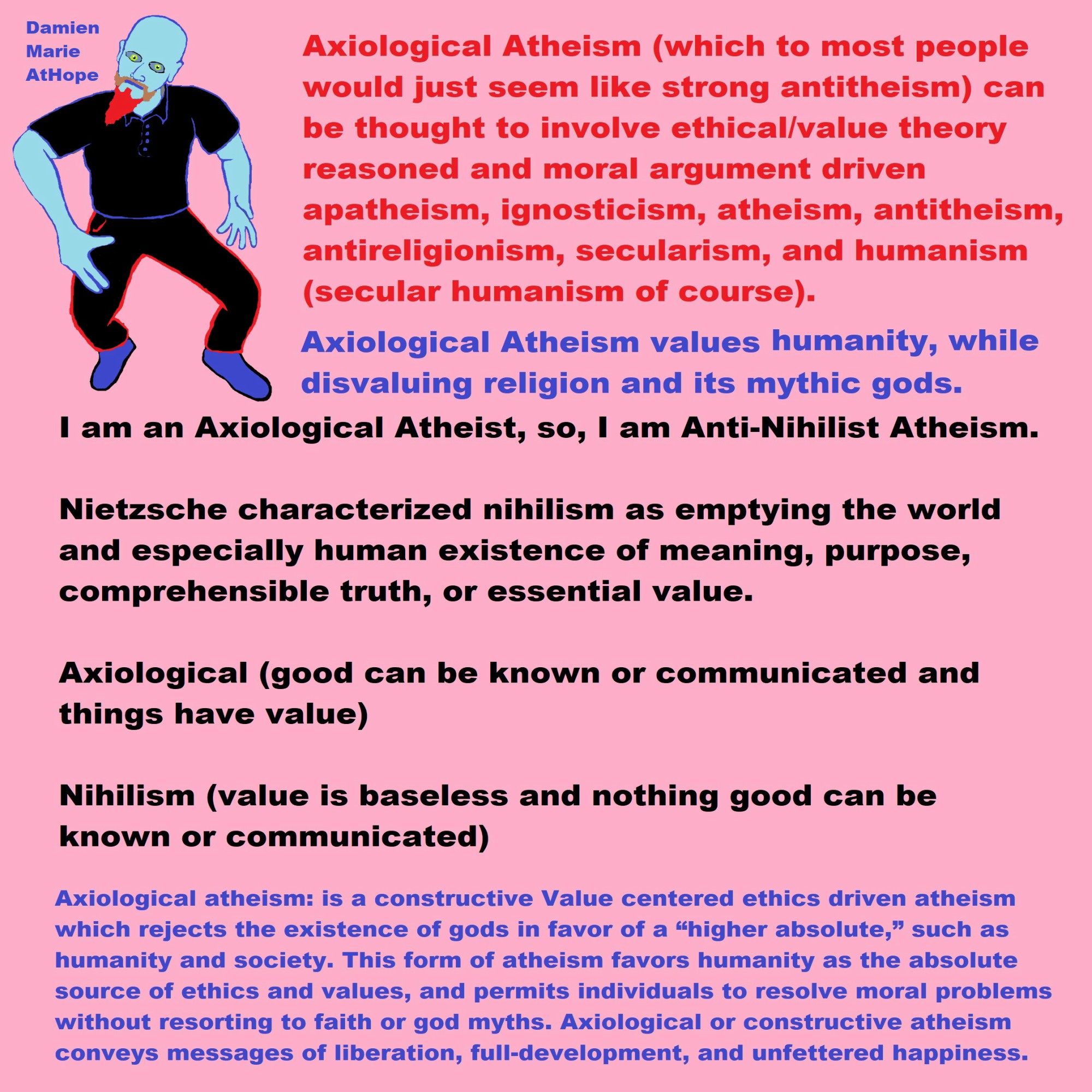

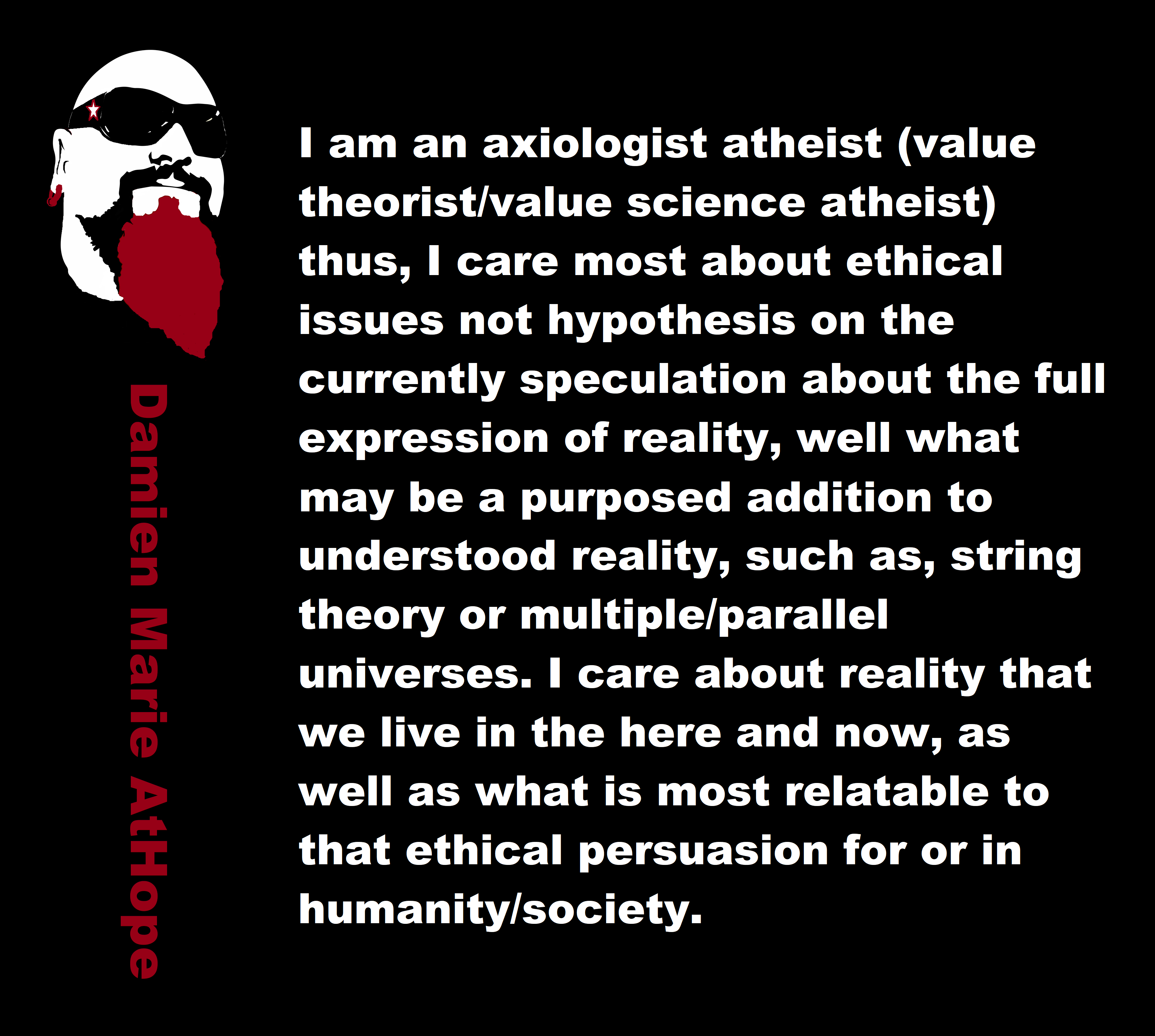
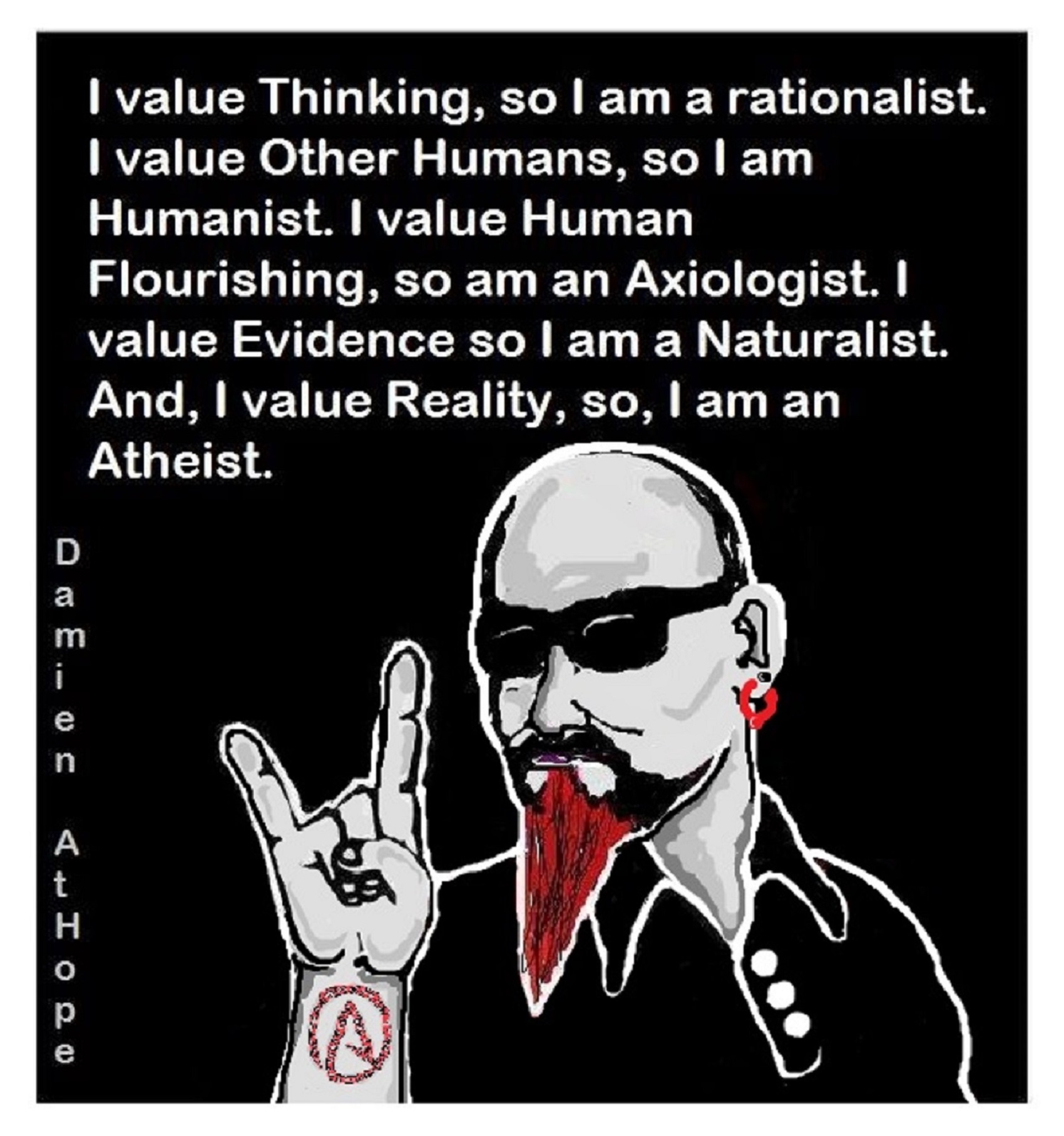

“Theists, there has to be a god, as something can not come from nothing.”
Well, thus something (unknown) happened and then there was something. This does not tell us what the something that may have been involved with something coming from nothing. A supposed first cause, thus something (unknown) happened and then there was something is not an open invitation to claim it as known, neither is it justified to call or label such an unknown as anything, especially an unsubstantiated magical thinking belief born of mythology and religious storytelling.

While hallucinogens are associated with shamanism, it is alcohol that is associated with paganism.
The Atheist-Humanist-Leftist Revolutionaries Shows in the prehistory series:
Show two: Pre-animism 300,000 years old and animism 100,000 years old: related to “Anarchism and Socialism”
Show tree: Totemism 50,000 years old: related to “Anarchism and Socialism”
Show four: Shamanism 30,000 years old: related to “Anarchism and Socialism”
Show five: Paganism 12,000 years old: related to “Anarchism and Socialism”
Show six: Emergence of hierarchy, sexism, slavery, and the new male god dominance: Paganism 7,000-5,000 years old: related to “Anarchism and Socialism” (Capitalism) (World War 0) Elite and their slaves!
Prehistory: related to “Anarchism and Socialism” the division of labor, power, rights, and recourses: VIDEO
Pre-animism 300,000 years old and animism 100,000 years old: related to “Anarchism and Socialism”: VIDEO
Totemism 50,000 years old: related to “Anarchism and Socialism”: VIDEO
Shamanism 30,000 years old: related to “Anarchism and Socialism”: VIDEO
Paganism 12,000 years old: related to “Anarchism and Socialism” (Pre-Capitalism): VIDEO
Paganism 7,000-5,000 years old: related to “Anarchism and Socialism” (Capitalism) (World War 0) Elite and their slaves: VIEDO
Paganism 5,000 years old: progressed organized religion and the state: related to “Anarchism and Socialism” (Kings and the Rise of the State): VIEDO
Paganism 4,000 years old: related to “Anarchism and Socialism” (First Moralistic gods, then the Origin time of Monotheism): VIEDO
I do not hate simply because I challenge and expose myths or lies any more than others being thought of as loving simply because of the protection and hiding from challenge their favored myths or lies.
The truth is best championed in the sunlight of challenge.
An archaeologist once said to me “Damien religion and culture are very different”
My response, So are you saying that was always that way, such as would you say Native Americans’ cultures are separate from their religions? And do you think it always was the way you believe?
I had said that religion was a cultural product. That is still how I see it and there are other archaeologists that think close to me as well. Gods too are the myths of cultures that did not understand science or the world around them, seeing magic/supernatural everywhere.
I personally think there is a goddess and not enough evidence to support a male god at Çatalhöyük but if there was both a male and female god and goddess then I know the kind of gods they were like Proto-Indo-European mythology.
This series idea was addressed in, Anarchist Teaching as Free Public Education or Free Education in the Public: VIDEO
Our 12 video series: Organized Oppression: Mesopotamian State Force and the Politics of power (9,000-4,000 years ago), is adapted from: The Complete and Concise History of the Sumerians and Early Bronze Age Mesopotamia (7000-2000 BC): https://www.youtube.com/watch?v=szFjxmY7jQA by “History with Cy“
Show #1: Mesopotamian State Force and the Politics of Power (Samarra, Halaf, Ubaid)
Show #2: Mesopotamian State Force and the Politics of Power
Show #3: Mesopotamian State Force and the Politics of Power (Uruk and the First Cities)
Show #4: Mesopotamian State Force and the Politics of Power (First Kings)
Show #5: Mesopotamian State Force and the Politics of Power (Early Dynastic Period)
Show #6: Mesopotamian State Force and the Politics of Power
Show #7: Mesopotamian State Force and the Politics of Power (Sargon and Akkadian Rule)
Show #9: Mesopotamian State Force and the Politics of Power (Gudea of Lagash and Utu-hegal)
Show #12: Mesopotamian State Force and the Politics of Power (Aftermath and Legacy of Sumer)

The “Atheist-Humanist-Leftist Revolutionaries”
Cory Johnston ☭ Ⓐ Atheist Leftist @Skepticallefty & I (Damien Marie AtHope) @AthopeMarie (my YouTube & related blog) are working jointly in atheist, antitheist, antireligionist, antifascist, anarchist, socialist, and humanist endeavors in our videos together, generally, every other Saturday.
Why Does Power Bring Responsibility?
Think, how often is it the powerless that start wars, oppress others, or commit genocide? So, I guess the question is to us all, to ask, how can power not carry responsibility in a humanity concept? I know I see the deep ethical responsibility that if there is power their must be a humanistic responsibility of ethical and empathic stewardship of that power. Will I be brave enough to be kind? Will I possess enough courage to be compassionate? Will my valor reach its height of empathy? I as everyone, earns our justified respect by our actions, that are good, ethical, just, protecting, and kind. Do I have enough self-respect to put my love for humanity’s flushing, over being brought down by some of its bad actors? May we all be the ones doing good actions in the world, to help human flourishing.
I create the world I want to live in, striving for flourishing. Which is not a place but a positive potential involvement and promotion; a life of humanist goal precision. To master oneself, also means mastering positive prosocial behaviors needed for human flourishing. I may have lost a god myth as an atheist, but I am happy to tell you, my friend, it is exactly because of that, leaving the mental terrorizer, god belief, that I truly regained my connected ethical as well as kind humanity.
Cory and I will talk about prehistory and theism, addressing the relevance to atheism, anarchism, and socialism.
At the same time as the rise of the male god, 7,000 years ago, there was also the very time there was the rise of violence, war, and clans to kingdoms, then empires, then states. It is all connected back to 7,000 years ago, and it moved across the world.
Cory Johnston: https://damienmarieathope.com/2021/04/cory-johnston-mind-of-a-skeptical-leftist/?v=32aec8db952d
The Mind of a Skeptical Leftist (YouTube)
Cory Johnston: Mind of a Skeptical Leftist @Skepticallefty
The Mind of a Skeptical Leftist By Cory Johnston: “Promoting critical thinking, social justice, and left-wing politics by covering current events and talking to a variety of people. Cory Johnston has been thoughtfully talking to people and attempting to promote critical thinking, social justice, and left-wing politics.” http://anchor.fm/skepticalleft
Cory needs our support. We rise by helping each other.
Cory Johnston ☭ Ⓐ @Skepticallefty Evidence-based atheist leftist (he/him) Producer, host, and co-host of 4 podcasts @skeptarchy @skpoliticspod and @AthopeMarie
Damien Marie AtHope (“At Hope”) Axiological Atheist, Anti-theist, Anti-religionist, Secular Humanist. Rationalist, Writer, Artist, Poet, Philosopher, Advocate, Activist, Psychology, and Armchair Archaeology/Anthropology/Historian.
Damien is interested in: Freedom, Liberty, Justice, Equality, Ethics, Humanism, Science, Atheism, Antiteism, Antireligionism, Ignosticism, Left-Libertarianism, Anarchism, Socialism, Mutualism, Axiology, Metaphysics, LGBTQI, Philosophy, Advocacy, Activism, Mental Health, Psychology, Archaeology, Social Work, Sexual Rights, Marriage Rights, Woman’s Rights, Gender Rights, Child Rights, Secular Rights, Race Equality, Ageism/Disability Equality, Etc. And a far-leftist, “Anarcho-Humanist.”
I am not a good fit in the atheist movement that is mostly pro-capitalist, I am anti-capitalist. Mostly pro-skeptic, I am a rationalist not valuing skepticism. Mostly pro-agnostic, I am anti-agnostic. Mostly limited to anti-Abrahamic religions, I am an anti-religionist.
To me, the “male god” seems to have either emerged or become prominent around 7,000 years ago, whereas the now favored monotheism “male god” is more like 4,000 years ago or so. To me, the “female goddess” seems to have either emerged or become prominent around 11,000-10,000 years ago or so, losing the majority of its once prominence around 2,000 years ago due largely to the now favored monotheism “male god” that grow in prominence after 4,000 years ago or so.
My Thought on the Evolution of Gods?
Animal protector deities from old totems/spirit animal beliefs come first to me, 13,000/12,000 years ago, then women as deities 11,000/10,000 years ago, then male gods around 7,000/8,000 years ago. Moralistic gods around 5,000/4,000 years ago, and monotheistic gods around 4,000/3,000 years ago.
To me, animal gods were likely first related to totemism animals around 13,000 to 12,000 years ago or older. Female as goddesses was next to me, 11,000 to 10,000 years ago or so with the emergence of agriculture. Then male gods come about 8,000 to 7,000 years ago with clan wars. Many monotheism-themed religions started in henotheism, emerging out of polytheism/paganism.

Damien Marie AtHope (Said as “At” “Hope”)/(Autodidact Polymath but not good at math):
Axiological Atheist, Anti-theist, Anti-religionist, Secular Humanist, Rationalist, Writer, Artist, Jeweler, Poet, “autodidact” Philosopher, schooled in Psychology, and “autodidact” Armchair Archaeology/Anthropology/Pre-Historian (Knowledgeable in the range of: 1 million to 5,000/4,000 years ago). I am an anarchist socialist politically. Reasons for or Types of Atheism
My Website, My Blog, & Short-writing or Quotes, My YouTube, Twitter: @AthopeMarie, and My Email: damien.marie.athope@gmail.com

